- Blog & Content Creation (3)
- Bucket List Destinations (39)
- Digital Nomadism (44)
- Scotland (46)
- Van Build (11)
- Van Life (6)

- Bucket List Destinations

Travel to Syria: The Ultimate Guide to Visiting as a Tourist
- 16th July 2022
- 10 minute read
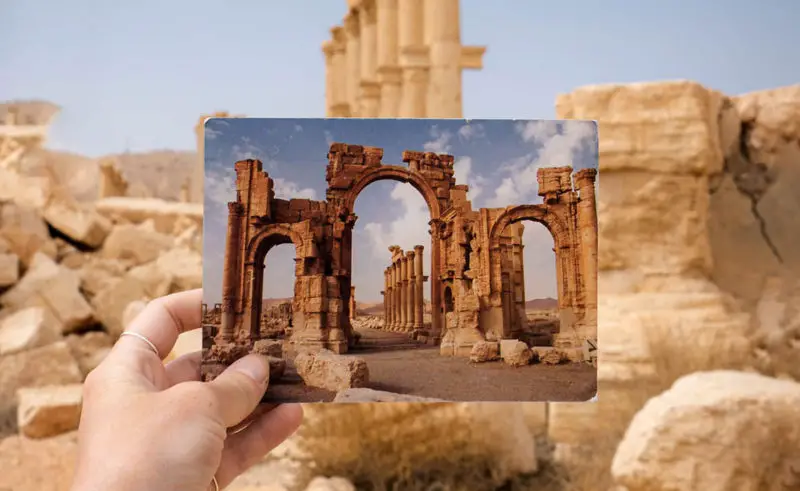
This will be, without a doubt, one of the most difficult destination blogs to compose. On the other hand, I personally feel a duty to share the notion of travel being possible in Syria – even amidst the internal and external battles that the country still currently faces today. Depending on your travel experience, it’s common to realise that the reality of most countries can be very different to the perception that mainstream media outlets try to convey… This applies to (many areas of) Syria too.
Table of Contents
Why should you travel to syria, travelling to syria as a female, what is it like travelling syria, in my experience…, how much spending money will you need, should you tip in syria, accommodation in syria, food in syria, internet in syria, weather in syria, what to wear in syria.
Don’t have time to read this now? Pin this blog for later .
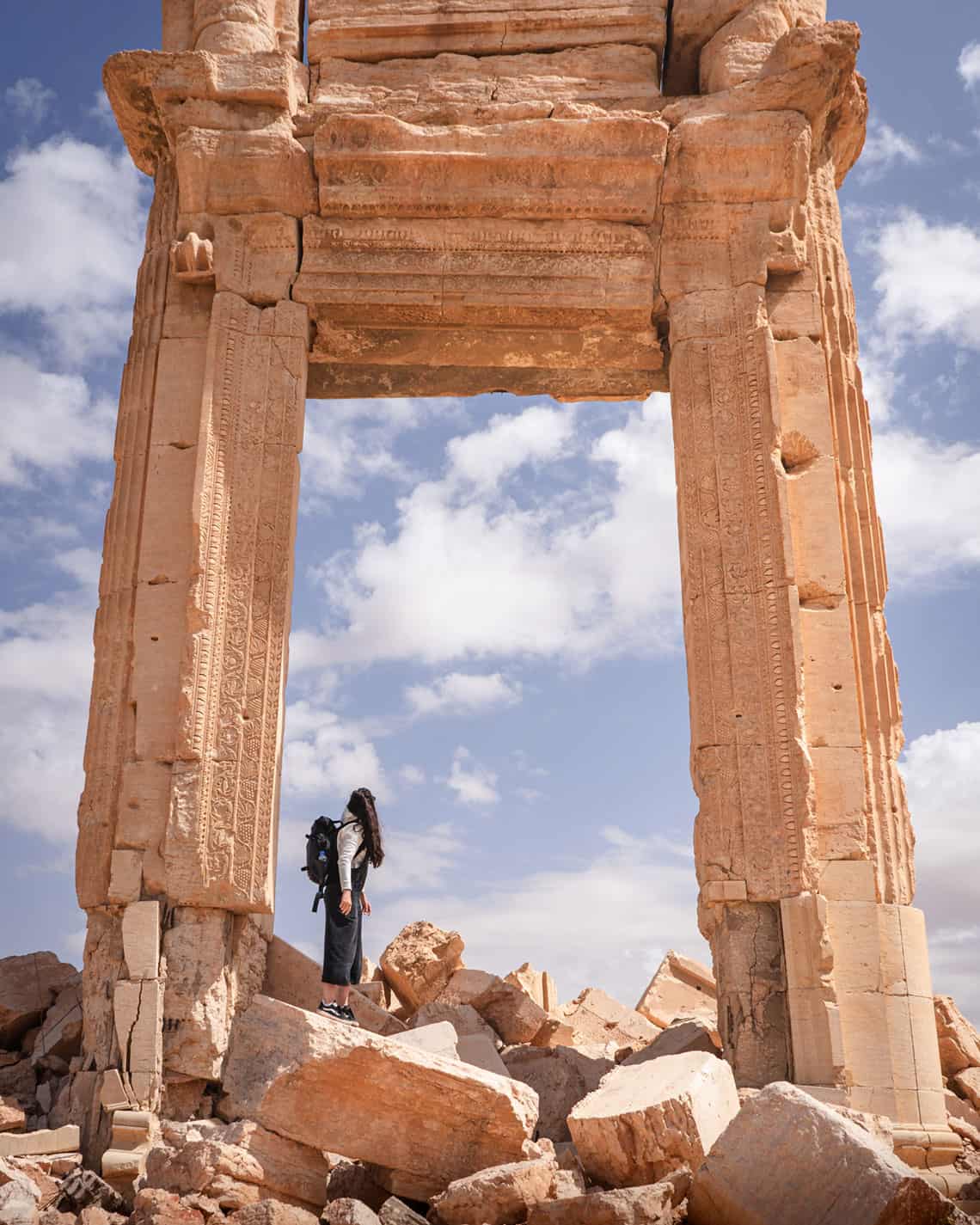
Syria could be one of the most emotionally difficult destinations you can visit today. It is clear to see that most of the landscapes, towns and characters have been shaped by the most recent war. Personal stories will continue to break your heart on a day-to-day basis. And as a consequence, military checkpoints patrol most corners of the road network and most of what remains to be visited by tourists.
Still and all, contrary to what much of the mainstream media would have us believe, Syria has many other stories to tell, especially to those who are courageous enough to visit.
Before 2011, popular hotel rooms and tour operators would be fully booked. Tourists from all around the world would flock in numbers to explore the incredible ancient structures, such as Palmyra and Krak des Chevaliers. So, whether you believe it or not, Syria once had a booming tourism industry. This is understandable because Syria has some of the richest histories and ancient sites in the world!
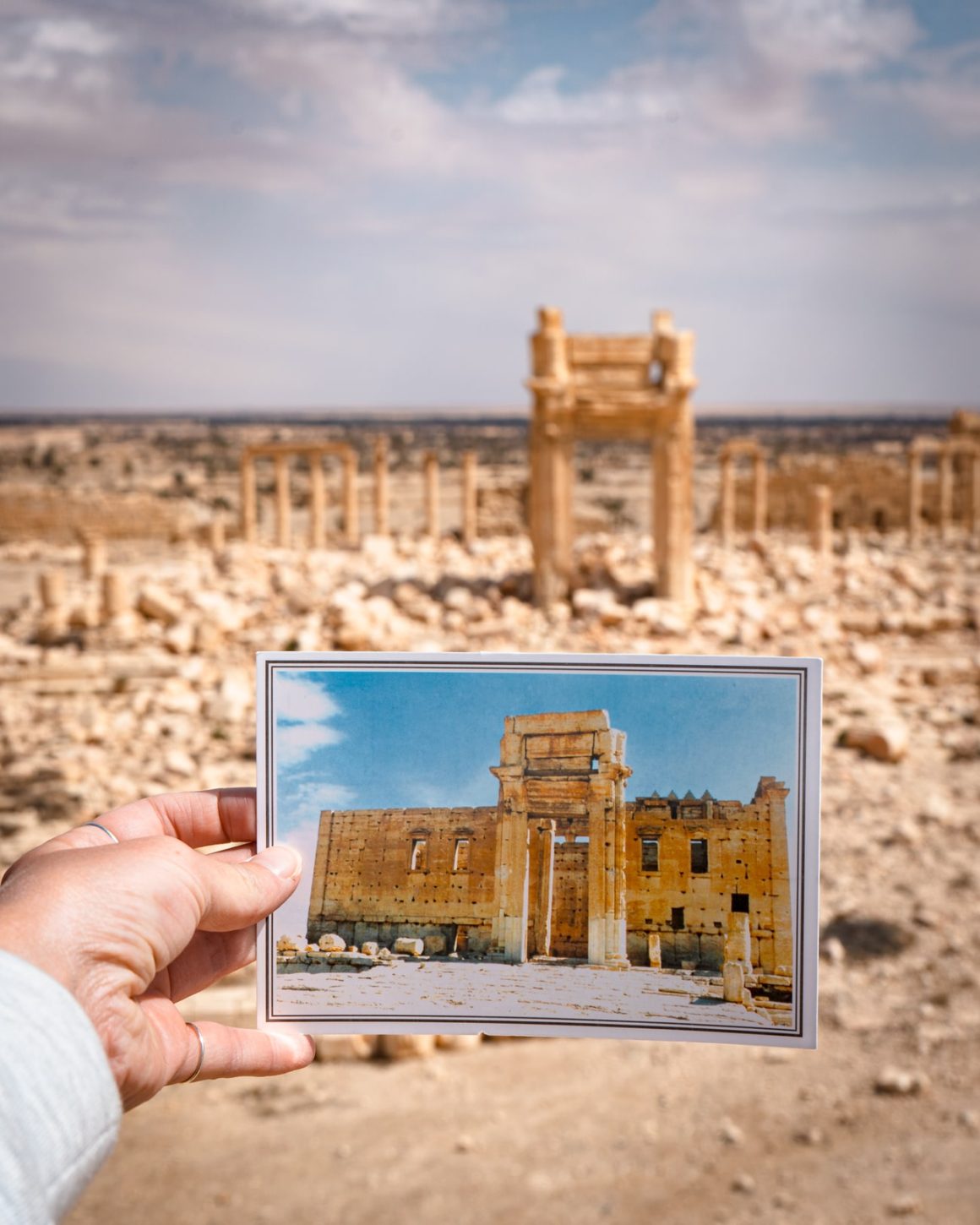
This personal insight is not a suggestion that Syria is ready for mass tourism yet. After all, for any open-hearted individual who is willing to cross the Syrian border and especially for the vast population of Syria, I can only have hope and faith that they will be able to host larger numbers again someday soon. Inshallah!
Is It Safe to Travel to Syria?
During the time this blog was written (July 2022) , it would be against foreign advice to travel to Syria. It’s also near impossible to find travel insurance that will cover your visit, due to the economic sanctions that multiple nations have placed on the country.
The intention of this blog is not to inform travellers that visiting Syria is completely safe – it’s not. In fact, there are many areas of the country that are still active conflict zones and undisputed territories. Nevertheless, the complete war zone that mainstream media outlets portray the entire country to be in, is simply misleading.
In fact, most curious locals generally point out their own personal concerns about how their country is perceived by other nations through the mainstream media. Therefore, I personally feel a duty to share their strong message of humankind, that the overwhelming majority of Syrians are not dangerous and are instead, very peaceful and loving people. By spending time with these local people from various areas of Syria, I was one thousand per cent assured by their heartwarming smiles that would grant peace to anyone with compassion that was blessed to be around them.
Of course, like in many other countries, things can change quickly. Therefore, I would urge everyone to do research and their own risk assessment before travelling. There are plenty of governments advising against travel to Syria, but similarly, a great amount of positive trip reports from western travellers on Facebook groups, forums and YouTube vlogs. All in all, it’s important that you travel to Syria with a trustworthy local contact in case the situation on the ground changes in an instant. If you are planning to travel with a reputable tour company, then keep in contact with their employees. They will be able to better advise you on the current security situation.
In all honesty, my experience in Syria as a female foreigner (with a local guide) felt very safe. From the countless welcoming encounters at the military checkpoints to the interactions with boys, guys and other women on the streets, I personally had zero threatening experiences.
Talking about what still stands in Syria today is almost unavoidable without also mentioning what has been lost, destroyed or taken over the years. It’s heartbreaking to hear and painful to see the devastation in any guide’s face whilst they tell the stories of destruction in what once stood before them. This is massively overwhelming to make sense of as a visitor.
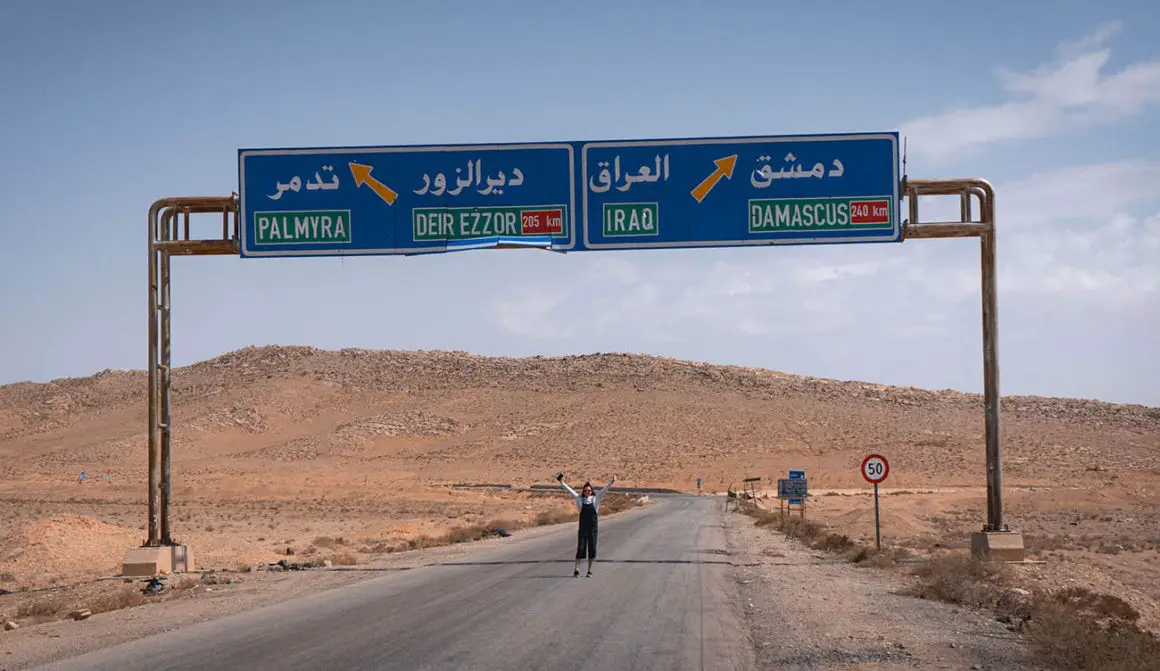
How to Get a Tourist Visa to Enter Syria
It’s important to note that foreigners cannot explore Syria 100% independently. Visitors need to obtain a visa with security clearance beforehand. This can be organised through a travel agency within the country. Once you arrive, the travel agency will provide you with a local guide that should accompany you over the entirety of your stay.
Gaining your security clearance through a local tour company is straightforward; the process will usually take less than 2 weeks, or in my case, 10 days. Normally, all that should be required is an image of your passport, employment status and occupation. This paperwork is important as it will be shown multiple times a day as you pass the many roadside checkpoints.
At the time of writing this (July 2022) , visas are not permitted for those with an Israeli stamp on their current passport.
I, and two other Brits, were driven across the border between Lebanon and Syria by an employee of the tour company we were in contact with beforehand. Overall, the border crossing was surprisingly smooth. We did not encounter any issues and were pleasantly startled by the extremely warm welcome and plentiful smiles from both the immigration officers and military staff on guard. In addition to our payment to the tour agency for a visa, we also paid $140 at a border office to enter the country. Our driver was very organised as he ushered us around the necessary desks on foot. There were some for our passports, a check of vaccine certificates, visas and what seemed to be another for his vehicle. Before we drove away, some uniformed officers briefly, but respectfully, checked the contents of our luggage too.
Exchanging Money in Syria
The currency in Syria is the Syrian Pound (SYP). You should bring either Euros or US Dollars to exchange in the country because, due to European and American economic sanctions against Syria, you will not be able to use any card to withdraw or spend money.
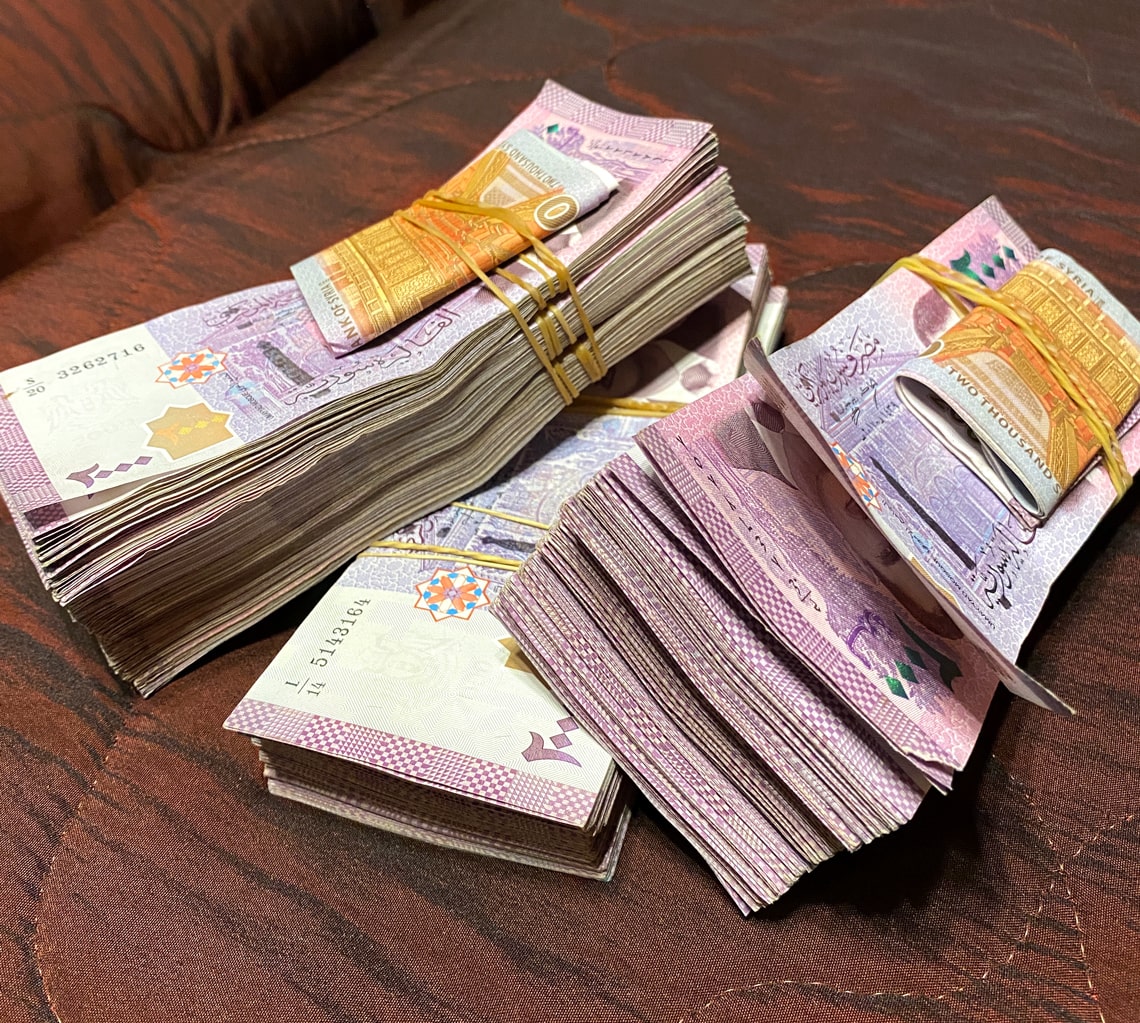
It is unlikely that you will be able to exchange Syrian Pounds back to US Dollars or Euros. Therefore, you should be sure not to exchange too much during your stay.
As a point of reference, I exchanged 100 USD to spend across seven full days in Syria. This is doable if you just need to pay for dinner, and you are not including alcohol or souvenirs. However, I’d recommend exchanging about 120-150 USD to be more comfortable. The exchange rate was approximately 3400 SYP to the dollar, but this figure is extremely volatile.
Small tips are welcome in Syria, but they are by no means mandatory. If you appreciate the time any local has spent with you at sites, telling you stories or taking your photograph, then I would suggest leaving a tip or small donation to contribute towards any restoration, rebuilding or loss of income.
Places to Visit When You Travel to Syria
Syria isn’t too geographically widespread. This means that you will not have to travel far to pack plenty into your itinerary. The typical Syrian road trip route is from the south (Damascus) to the north (Aleppo) with a day trip slightly to the east (Palmyra). If you would like to deviate from this common route, then you should arrange this with your tour operator beforehand. Once you arrive, the security clearance for each location cannot be changed.
If you have any doubt about your travels to Syria, the Old City of Damascus will immediately reassure you that your venture will be worth any initial anxieties. This will likely be your first destination, and I personally, have no doubt that you will be greeted with ear-to-ear smiles and warm hospitality.
Thankfully, much of the Old City of Damascus still remains today. So as you arrive, you’ll quite naturally be eager to explore the lively and narrow cobblestoned streets that lead towards the hustle and bustle. I wouldn’t blame you! The journey is inviting, exciting and very tasty!
Krak des Chevaliers is one of the most famous castles in the world! It’s reasonably easy to visit considering the site is a 45-minute drive from the city of Homs. In English, ‘Krak des Chevaliers’ translates to ‘Castle of the Knights’ which is incredibly fitting considering that this is one of the greatest fortresses built by European crusaders. In addition, it’s almost certainly one of the better preserved too. Without the distractions of information boards, unsightly barriers, excessive lights and shuffling crowds, it’s so much easier to try visualising what life could have been like in the confines of these walls.
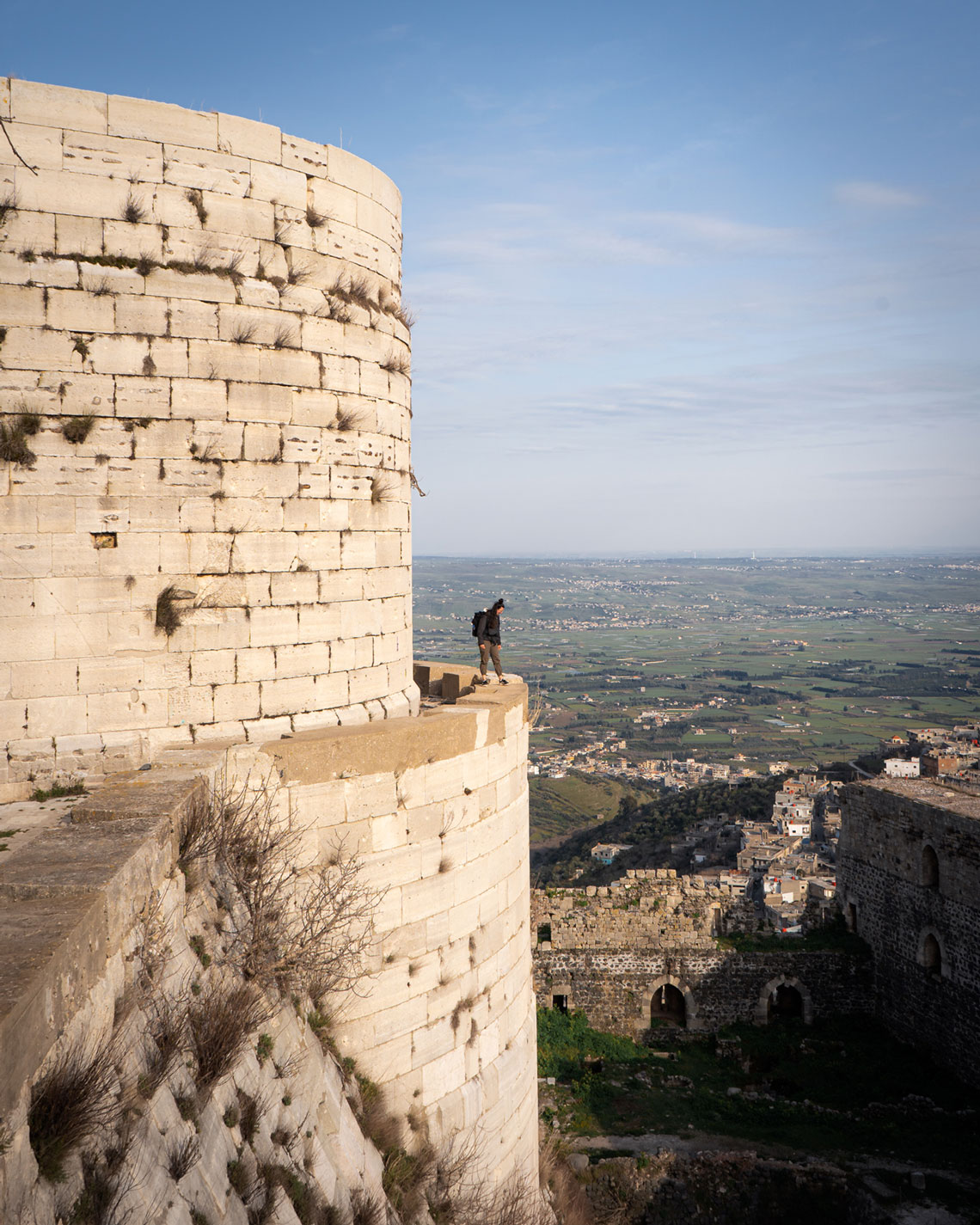
The population of Aleppo are bound to sing to you!… If not directly, then you’ll hear the melodic local songs as you explore the citadel and souks. They’re beautiful!
Aleppo’s Old City is one of the oldest in the world. This faced a severe amount of destruction during the conflict. For instance, the Great Mosque was completely destroyed. But fortunately, there are visible signs of the most restoration you are likely to witness in Syria. Nevertheless, a day of exploration in Aleppo can be very emotional as it will take years for the city to return to a similar condition it once was.
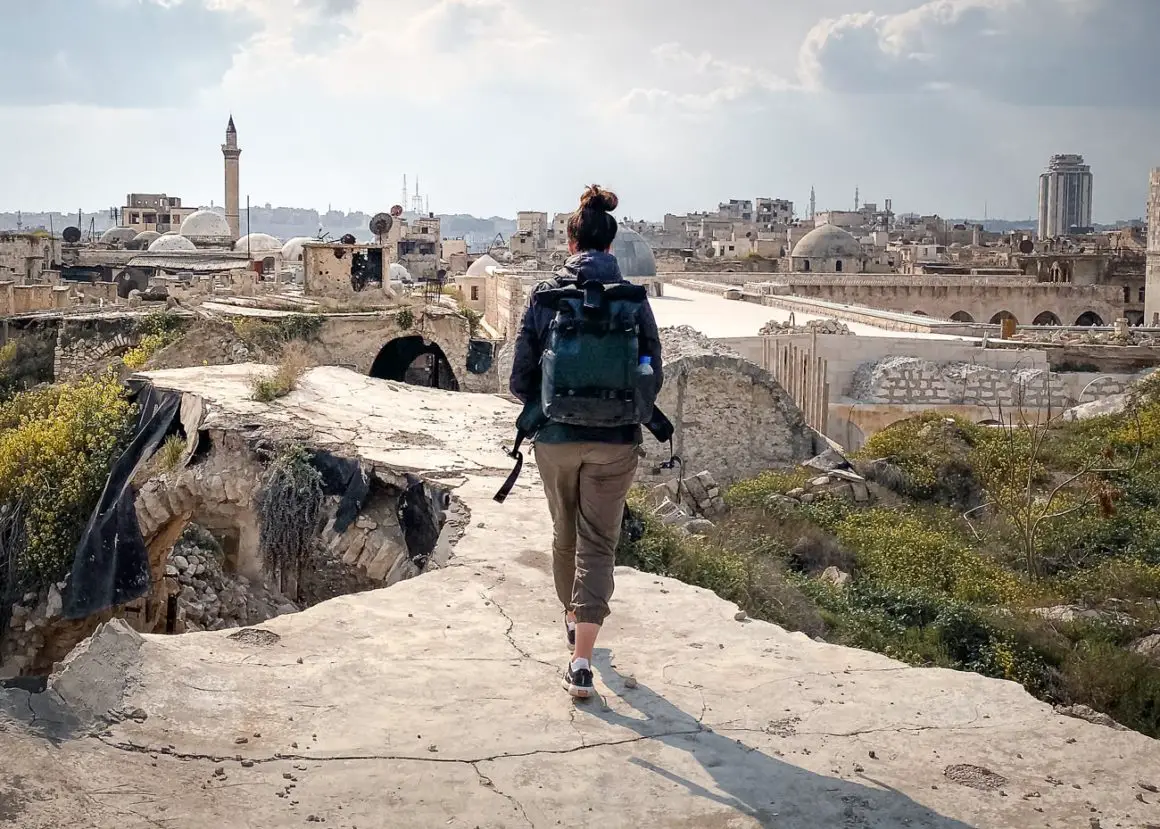
This historical site was once among Syria’s top attractions. Now, a visit to Palmyra comes with great sadness as considerable damage was inflicted by ISIS in 2016. The destruction is vast, though there are signs of reorganisation and restoration.
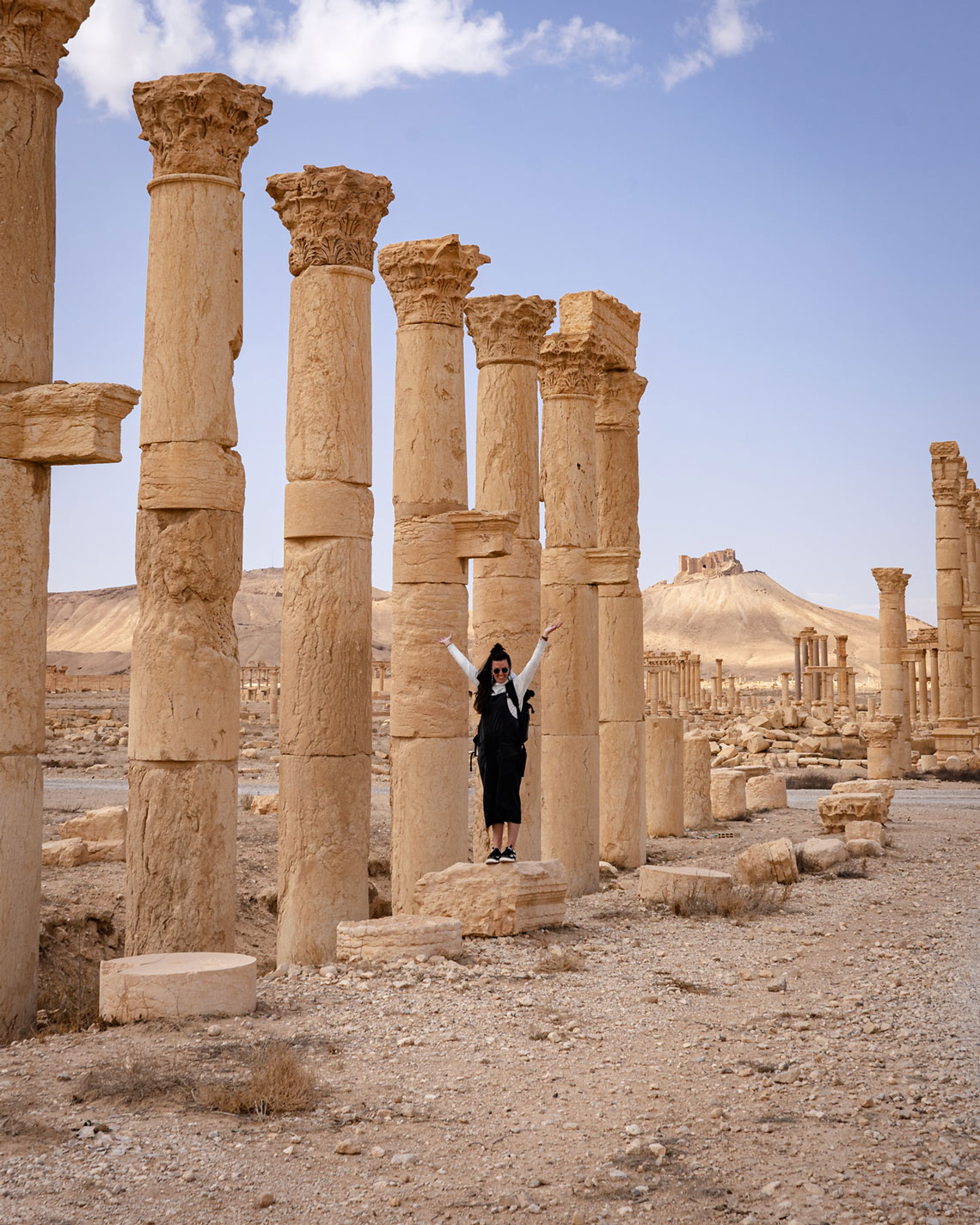
Maaloula is an ancient Christain town, hidden in the mountains of Syria. It’s one of the few places remaining in the world where Aramaic, the language of Jesus, has survived as a spoken dialect. The entire language is being kept alive by the parents of Maaloula who continue to use the language around their children every day.
Hama is a popular place to stretch off the car journey between Damascus and Aleppo. Plus, the numerous waterwheels in Hama are famous in Syria. Fortunately, they have managed to remain intact.
Bosra is approximately a 2-hour drive from Damascus. The area is an anomaly to the other cities as there aren’t constant photographs of the president scattered around the streets. Instead, you’ll find green Syrian flags draped across the ruins or painted on walls. Needless to say, there is still no visible animosity from either side in the area, and tourists are able to visit with the appropriate paperwork.
Bosra was once a major stopover along the ancient caravan route to Mecca. Now, it’s a major archaeological site that includes monuments, churches, mosques and a magnificent Roman theatre. Fortunately, the theatre escaped too much damage from the recent conflicts. In fact, just before the war, events were still being held inside.
There are many amazing hotels in Syria; some that could even tell a thousand stories! It is likely that you’ll begin your Syrian adventure at the Beit Al Wali Hotel in Damascus. Three traditional 18th-century houses were renovated and combined to create a grand space with a warm atmosphere for visitors to relax after exploring the nearby chaos of Damascus’ Old City.
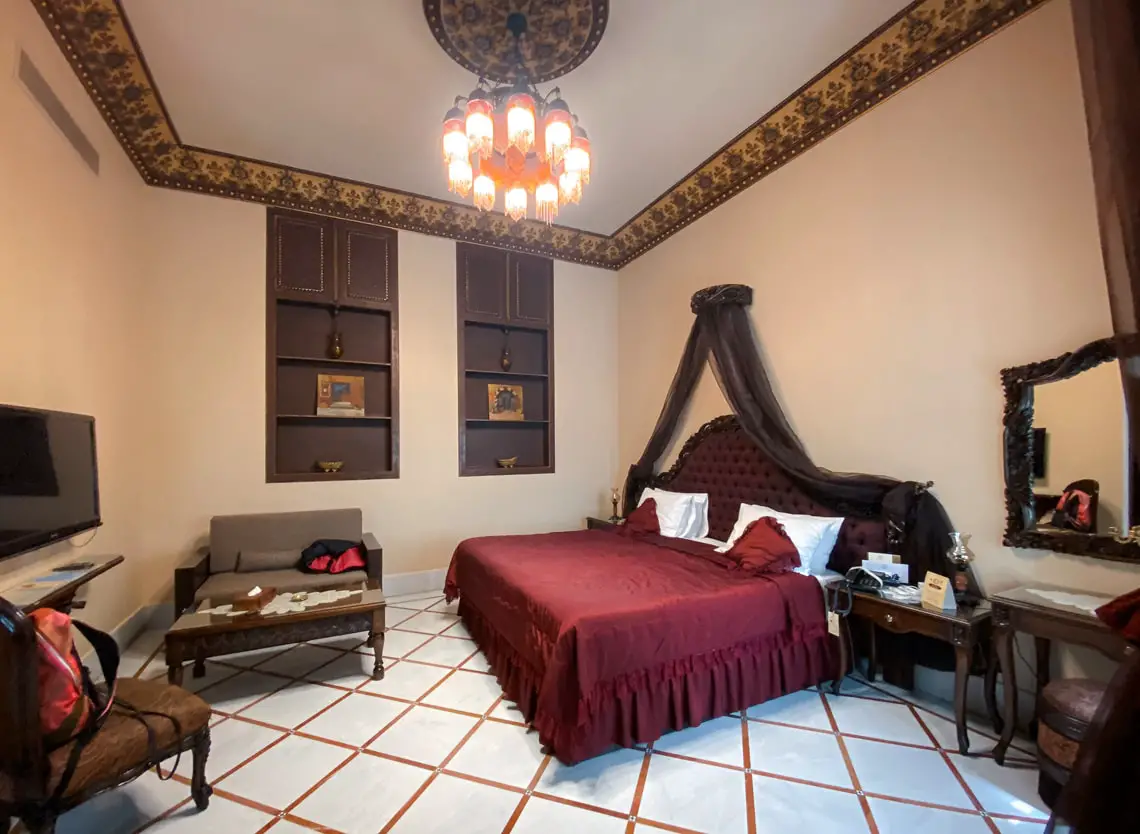
The Laures Hotel is another example of accommodation in Syria.
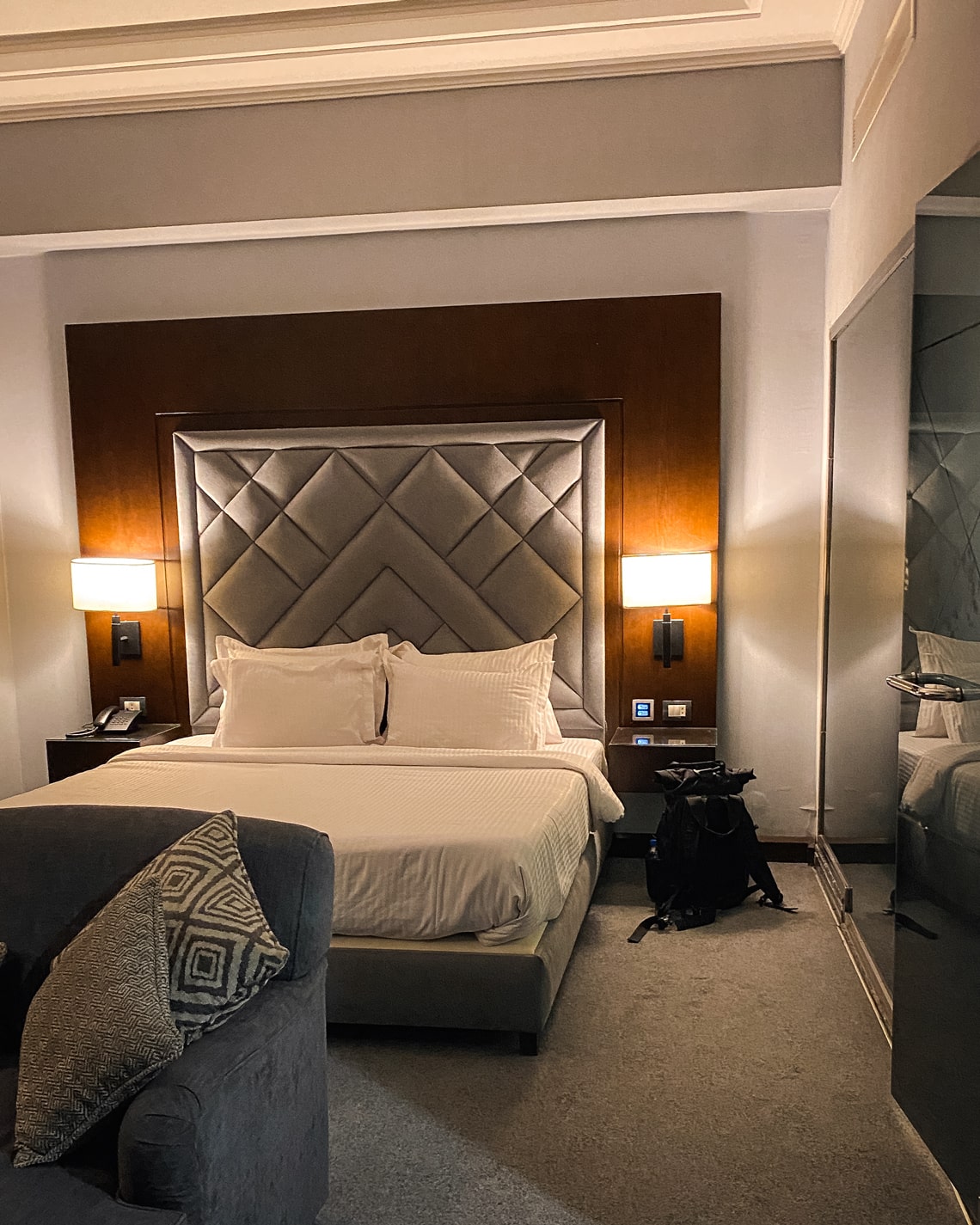
You may want to consider visiting Syria for the food alone! Syrian cuisine is fresh, healthy and extremely tasty. You aren’t going to want to skip any meal here, no matter where you are in the country.
Syria is also an easy destination for vegetarians or vegans as there are always plenty of salads, bread, falafel and hummus. Popular dishes include tabouleh, fatoush, shwarma and baklava.
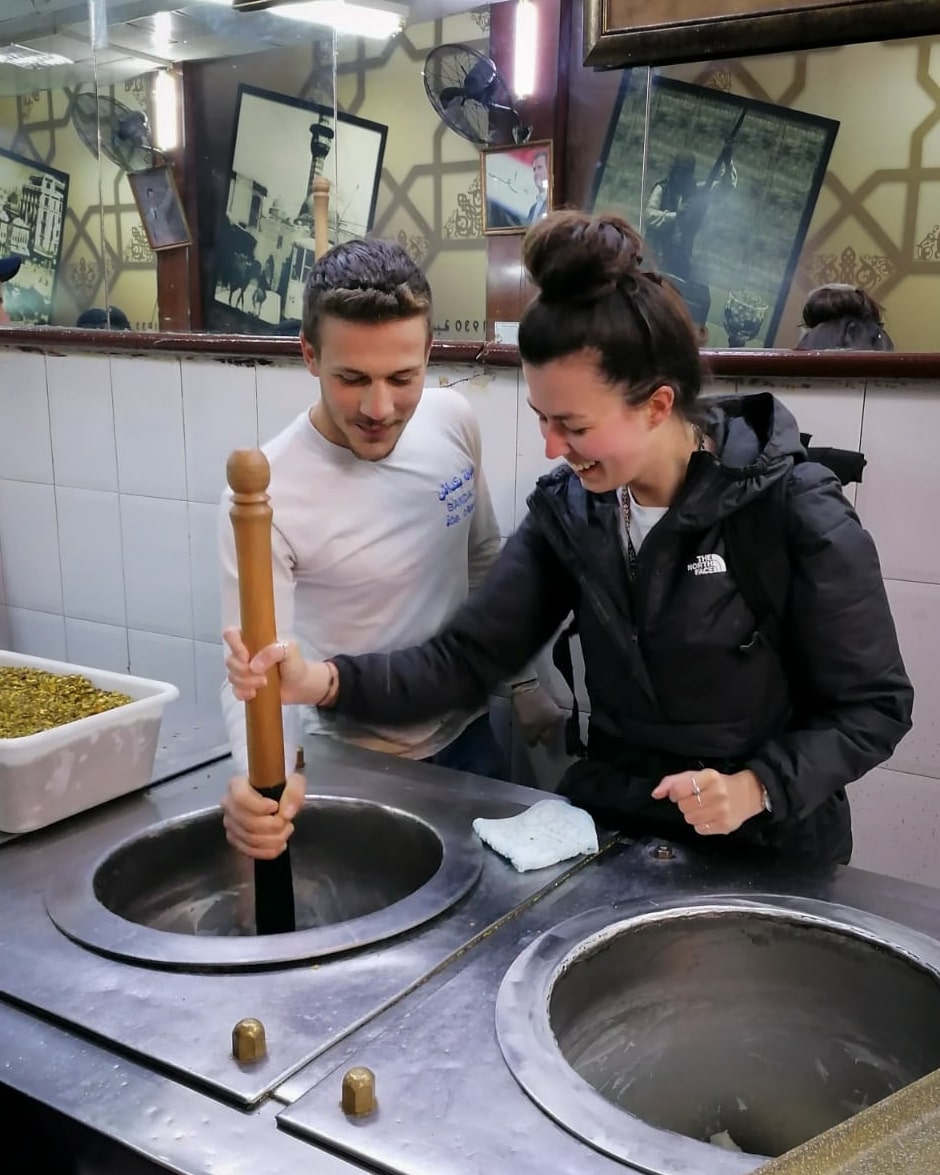
Syrians typically eat a variety of foods for breakfast. This was clear to see during the very colourful spreads we would be presented with every morning. Platters normally include pitas, a variety of cheeses, eggs, olives, hummus, vegetables and labneh. The food would come accompanied by either coffee or tea (and even a shisha – if you’d prefer) .

Most hotels, restaurants, coffee shops and bars in Syria have free wifi. The connection may not be the fastest, but it’s certainly enough to check your socials and emails or to message home.
If you require a constant connection, ask your tour operator for a local SIM card. They tend to have a reasonably reliable connection and signal strength.
The most ideal time to visit Syria would be between March and May when the temperature is around 20°C. Similarly, but without as many blossoming flowers, between September and October is also a reasonable period to visit Syria.
Summer temperatures can reach 45°C whilst winter can be wet, cold and with the possibility of snowfall. Yes, snow!.. It might be hard to imagine, with Syria being in the Middle East, but snow can cause the road between Beirut and Damascus to be closed from time to time.
It is recommended that women dress modestly in Syria. Loose-fitting clothes would ideally cover your shoulders and knees. However, it is also likely that you’ll notice local Syrians not following this custom, especially in Damascus.
You could also take a scarf to cover your hair or body parts in any mosque, but alternatives are often provided upon entering. Hence the cloak that can be pictured below…
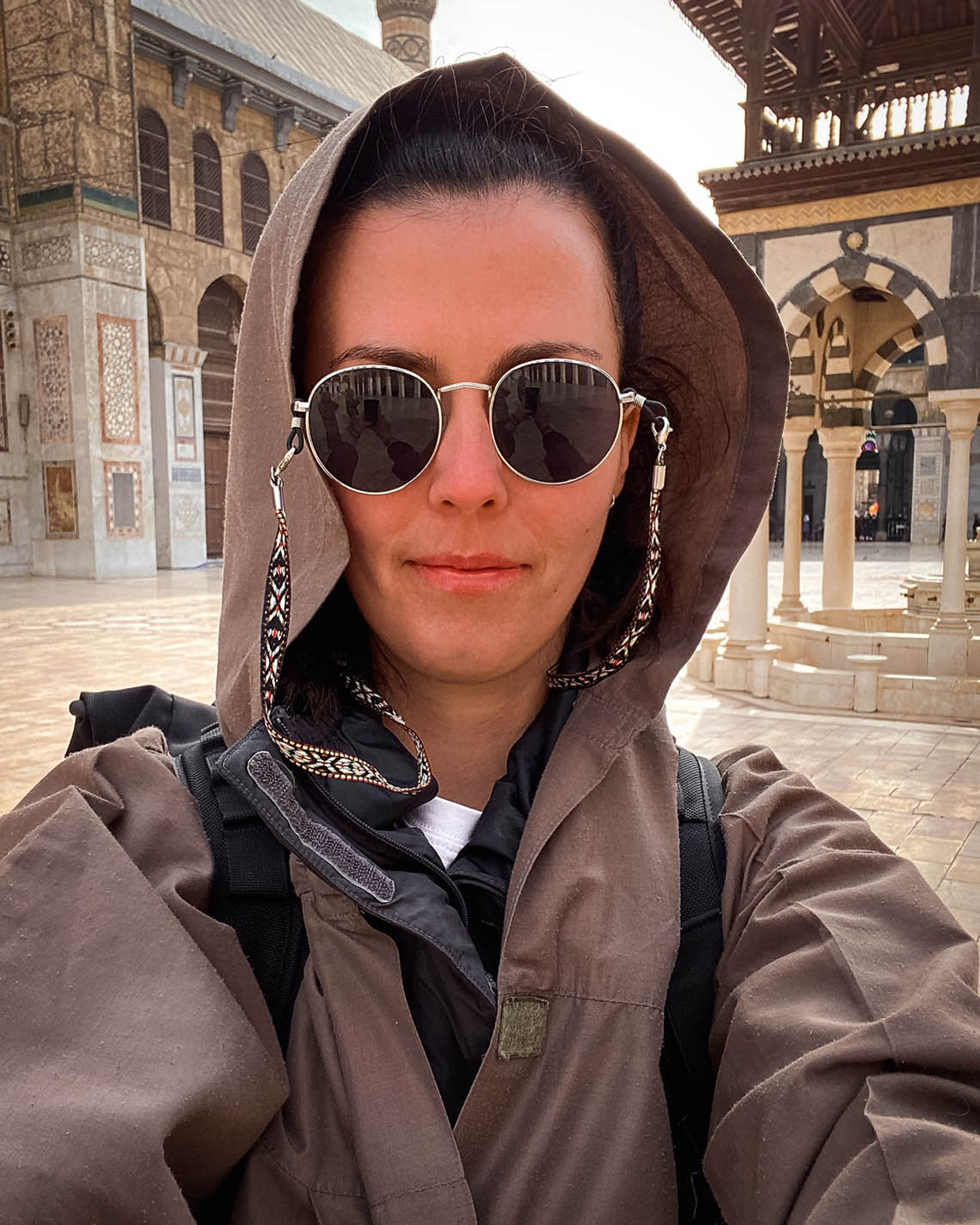
Let’s go! @katie.maree
Did You Know…
If you purchase through a KatieGoes link, you still pay the sam e but we receive a small amount. This contribution helps keep this blog moving – win, win! Nevertheless, I only recommend personal favourites…
🎒 My Gear : Check my travel essentials for backpacking, van life and outdoor adventures.
🏥 SafetyWing : Stay protected with travel insurance made by nomads, for nomads.
📱 Airalo : Always be connected with a super simple eSim for almost every country!
🦈 SurfShark : Safely explore the internet with a world-renowned and trusted VPN .
💰 Wise : Send or receive money internationally for minimal fees – my life saviour!
👫 GetYourGuide : Find group tours, guides and day trips at unbeatable prices.
Save this on Pinterest
Do you not have time to read this ‘Travel to Syria’ guide? Click on the Save button to pin this article for later.
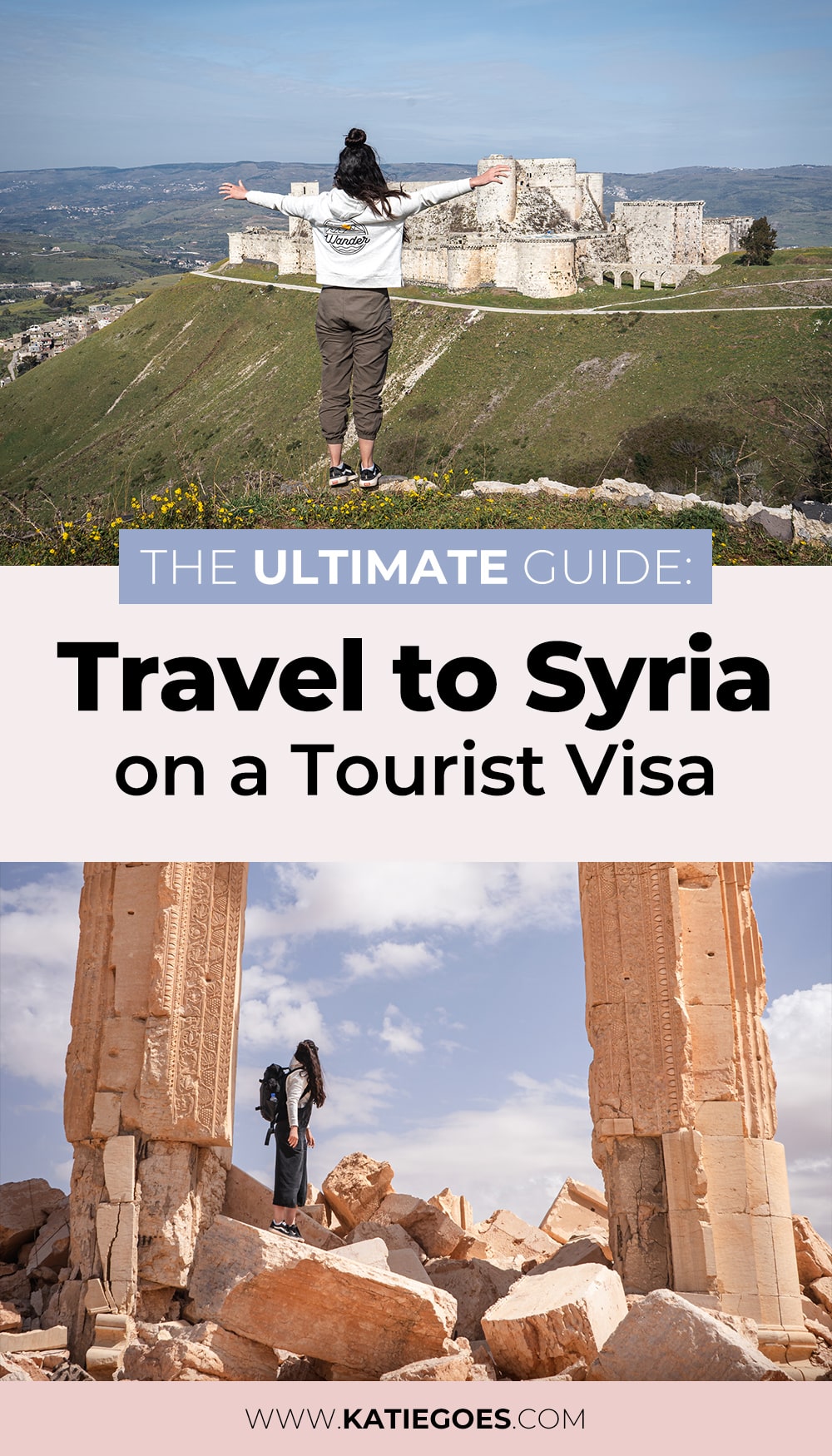
Hey! I'm a Scottish backpacker turned digital nomad with a passion for the outdoors, van life, and international travel. I travelled 100 countries before I turned 30 years of age. Now... Let's go everywhere!
You May Also Like

Great Ocean Road Campervan Itinerary & Full Trip Guide
- 6th February 2024

Tuvalu Travel Guide: How to Get to Tuvalu & Where to Stay
- 5th February 2024
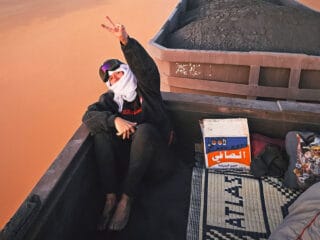
How to Ride the Iron Ore Train in Mauritania (Safely!)
- 4th February 2024
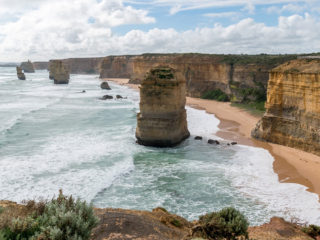
9 BEST Great Ocean Road Tours from Melbourne
- 25th February 2023
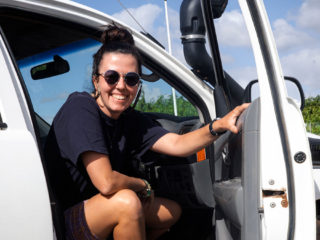
How to Get a Job in Australia as a Foreigner (The ULTIMATE Guide)
- 18th February 2023
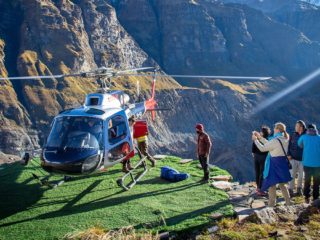
19 AMAZING Things To Do In Pokhara Lakeside (Day & Night)
- 19th December 2022
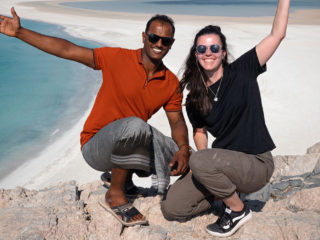
The 13 BEST Things to See on Socotra Island
- 16th December 2022
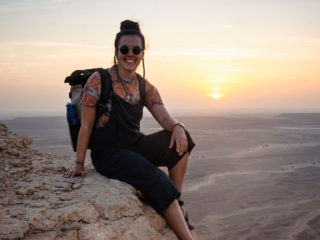
13 Saudi Arabia Travel Tips You MUST Know
- 11th December 2022
- Pingback: New York for Digital Nomads: Work Remotely in NYC - KatieGoes
- Pingback: 25+ AWESOME Resources for Digital Nomads - KatieGoes
Hello, i want to go to Syria which company you chose? I am in a tight budget. Please tell me, i go in January!!
Really interesting post, would you recommend the tour agency you went with? If so would you be able to share their name please?
Leave a Reply Cancel reply
Your email address will not be published. Required fields are marked *
Save my name, email, and website in this browser for the next time I comment.
Input your search keywords and press Enter.

Exploring Life's Small Moments in a Vast World
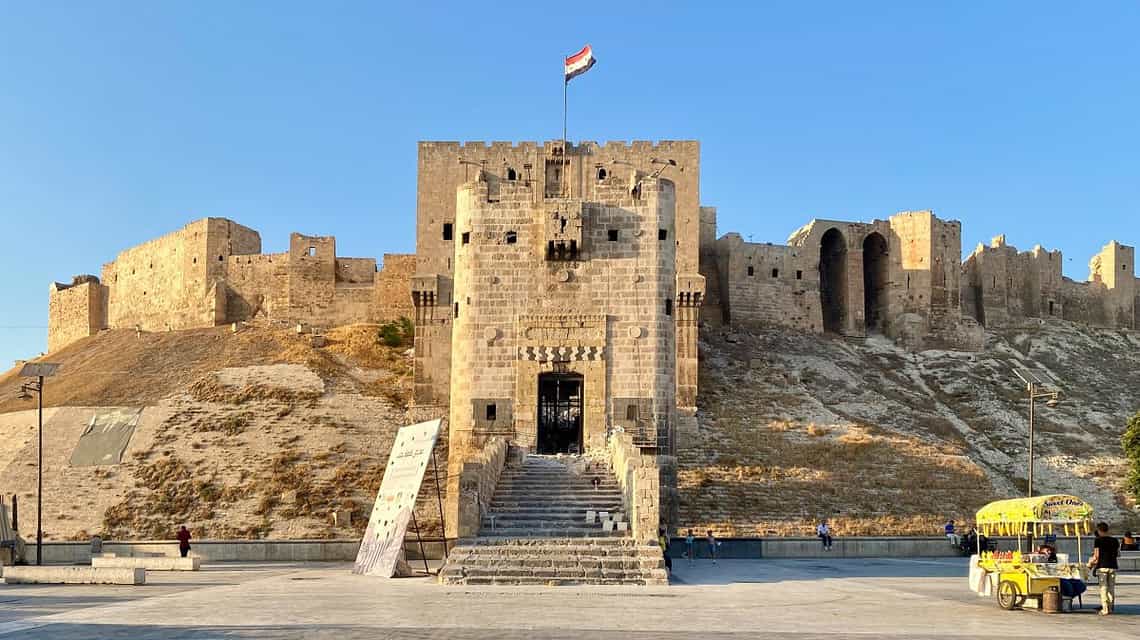
Traveling to Syria (2024): Everything you Need to Know
Syria is a country filled with history, culture, and natural beauty. Situated in the Middle East, it has a rich past, full of ancient cities and cultural centers waiting to be explored.
While traveling to Syria might seem strange or even crazy to some people (That was the case for me, too, before I did my research and learned more), the country has emerged as a prominent travel destination in the past few years.
I had the privilege of spending 6 days in this wonderful country, and I can surely say that traveling to Syria was a life-changing experience.
If you want more to be persuaded, you can read my guide with 25+ compelling reasons to Visit Syria in 2024.
A Little Bit Of History
Syria has a long and varied history that goes back thousands of years. Since the ancient times, it has been home to many different civilizations like the Phoenicians, Assyrians, and Romans. It has served as a crucial center for both Christianity and Islam (Impressive, isn’t it?).
Over the centuries, Syria has been ruled by different empires, such as the Byzantines and Ottomans. The modern Syrian state gained its independence in 1946.
Historic fun fact: In 1958, Syria and Egypt came together to form a union called the United Arab Republic (UAR). Egypt’s President, Gamal Abdel Nasser, had a vision of uniting Arab countries to stand against foreign influences. The union was announced from the balcony of a historic hotel in Aleppo (More to that in the next article). However, it didn’t last long, mainly because of differences in culture, politics, and money. The union ended in 1961. Even though it was brief, it showed how tough it can be for Arab countries to unite, while also highlighting their desire to work together.
Most probably, however, you might have heard of Syria because of its more recent and- let’s be honest-troubled history.
What’s The Situation In Syria Right Now?
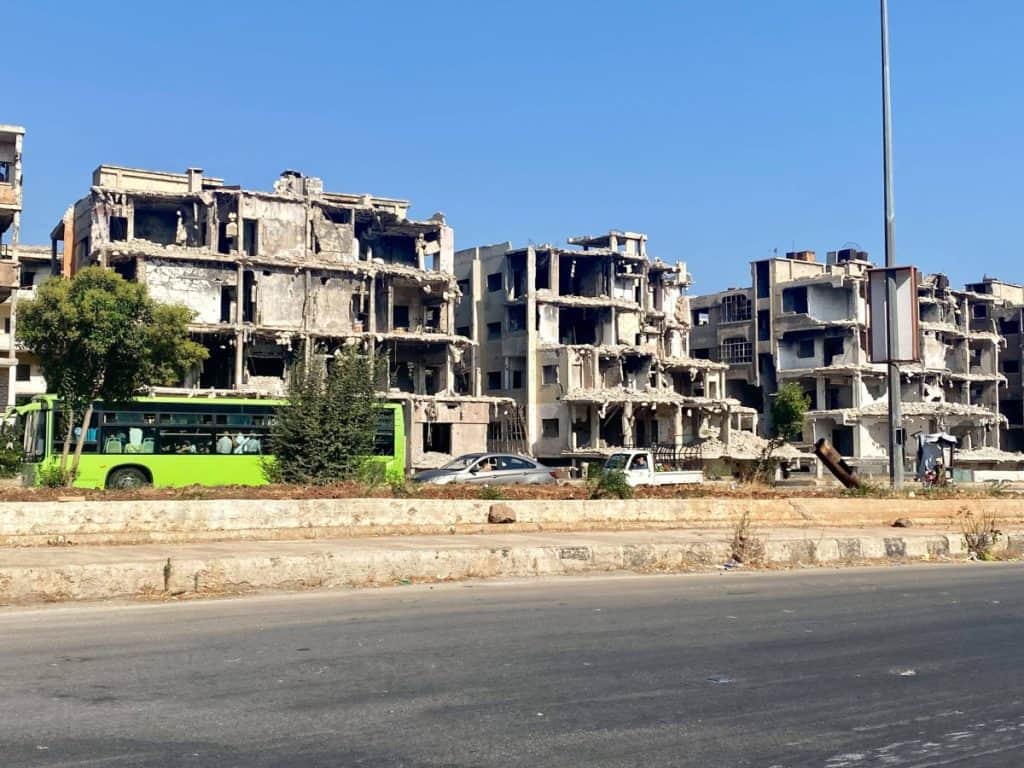
The Syrian crisis is a very complex topic which involves multiple different sides and will need much more than one paragraph to be covered. So, to save time and energy, I will not dive deeply into that.
There are many great sources to get information from, and I would surely recommend to do so before traveling to Syria, because it is a very interesting part of human history.
Basically, to give some context, the Syrian Government has regained control of most of the country, while the conflict has entered a period of stalemate. We could start speaking about the end of it, as many consider the Government the winner.
Is It Possible To Travel To Syria?
In the last few years, Syria has opened its borders to foreign visitors. In fact, in 2023, more than 1 million foreign visitors and 1.2 million Syrians from abroad chose the Middle Eastern country for their vacation. This was also the first year the country welcomed American tourists.
Americans had been banned from traveling to Syria for the past years years, but that’s no more the case. US citizens can now visit the country as tourists. However, as we will discuss later, the visa fees for them are a bit higher than for travelers from the rest of the world. There should be no other problem for Americans traveling to Syria, though.
Is It Safe To Travel To Syria In 2023?
This is one of the most common questions I got asked from everyone who knew about me traveling to Syria. The answer is rather complicated.
While the Syrian Government has gained back control of the majority of the country, there are still a few places occupied by rebel groups. However, the only places you are allowed to visit when traveling to Syria as a tourist are the ones that belong to the Government. These places have been out of the conflict for quite some time and are safe to visit.
During the entire time I was exploring Syria, I felt as safe as everywhere else I’ve been. For me, it was no different from any other Middle Eastern country.
One of the first things that has to come to your mind when planning a trip is insurance.
Safetywing’s Nomad Insurance is one of the best options available out there. With a maximum coverage of 365 days, they are a great option whether you are a Nomad or not! They offer very low rates, but excellent coverage and immediate support (in a few minutes!). The best part? Nomad Insurance can be purchased even if you have left your home country already.
Lastly, they also cover extreme sports , something that can come in very handy if you are an adventurous soul.

*please note that Nomad Insurance does not cover travel to Syria. However, they are an excellent option for the rest of your trips.
As long as you are with your guide and listen to what they advise you, you‘ll be alright. You will pass many checkpoints and see a lot of soldiers around, but they are there to protect you. You’ll always be greeted with a smile and a warm “Welcome.”
There have been a few moments of tension in recent years. However, the Government always canceled visa approvals whenever they thought the country was unsafe for visitors.
Obviously, I cannot guarantee anyone’s safety when traveling to Syria, and you always travel at your own risk. However, I can say that there was no place in the country where I felt insecure, even a tiny bit.
Is It Ethical To Travel To Syria?
Now, let’s get to the tough part. There has been a long-lasting debate on whether traveling to Syria (or any other country that has suffered in the past few years) is ethical. Even for a long time after deciding to plan this trip, I had only one question in my mind: “Am I doing the right thing?”.
Many people asked me if I had thought this through, and many others condemned this trip and deemed it wrong or irresponsible before it started.
After spending a few days in this fantastic country and having the chance to speak with a few people, I think I have my answer.
The truth is that Syrian people want tourists to come to their country. There are a few reasons for that.
First, it is proof that life is slowly getting back to normal after many years of suffering, and the once-thriving tourism sector is starting to step on its feet again. Syrians are proud people. They feel very happy that someone trusts them by visiting their country after all that has happened.
They are more than willing to reflect this trust back to you. They will tell you stories of their past, happy or sad, but always with a smile on their face. There were many days in my trip that felt like I was receiving love from everywhere. There is no other way of explaining this feeling, just love.
Secondly and most importantly, Syria has been hit hard by the consequences of the war. Western sanctions have put a heavy toll on Syrian people, who see their buying power reduced with each passing day.
Syria cannot export its goods and bring foreign cash into the country, which results in a recycling economy with massive inflation. To Syrian people, money brought from outsiders like tourists can be lifesaving, as tourists might be their only source of income for their businesses.
Obviously, what is considered right and wrong is subjective. After my experience in Syria, I no longer have an internal debate on whether going through with this trip was ethical or not. I witnessed people striving to rebuild their lives and make their stories heard.
Regardless of my personal opinion on the war and the situation around it, I believe that the benefits of tourism for the people far outweigh the morally grey areas of the trip. Boycotting tourism and not traveling to Syria for “ethical reasons” is going to hurt the locals more than the ones it was intended for. That sounds a bit unethical, too, isn’t it?
How To Travel To Syria In 2023
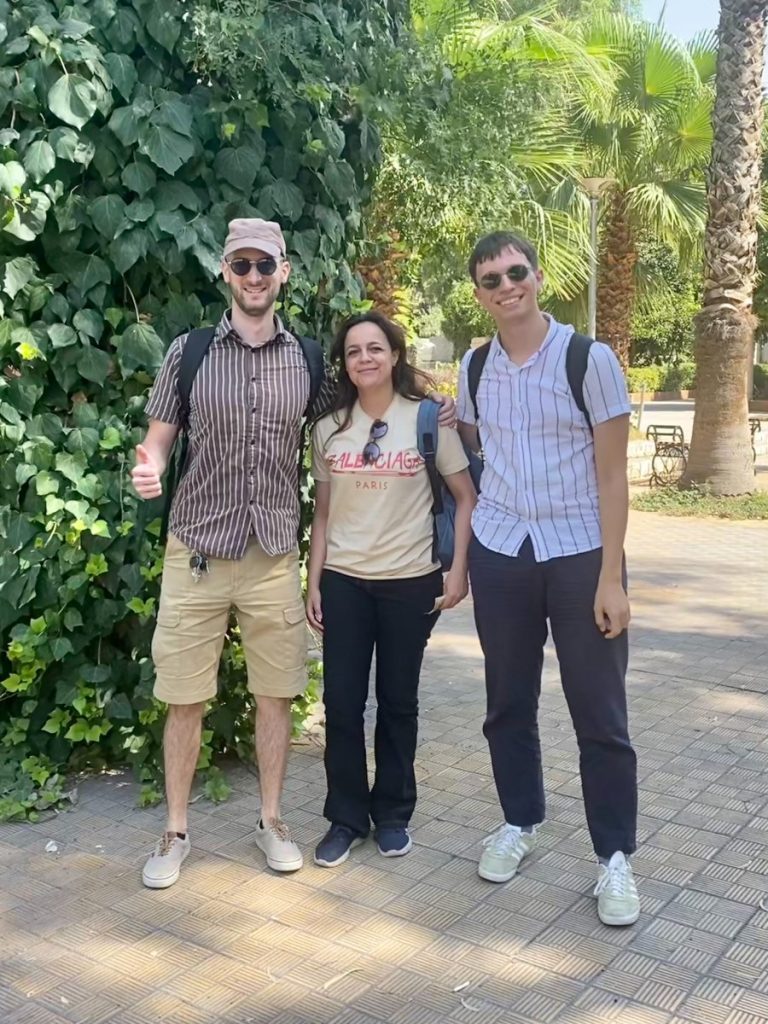
The first thing you should know about traveling to Syria is that since 2018, you must organize your trip with a local tour operator.
We chose to do our trip with Golden Team Syria . They have one of the most reputable travel agencies in the country. They took care of everything for us before we arrived. They were excellent professionals and tried their best to fulfill every request that we had.
A driver and guide were solely dedicated to our trip, and they eventually became our friends. Sally and Abo Azad, if you are reading this, thank you for making this trip unforgettable.
I will definitely choose Golden Team again next time I will be traveling to Syria, and I would highly recommend them. You can find more information on their website. Just tell them the places you would like to visit and the days you have available, and they will try to make the best program possible.
Do I Need A Visa To Travel To Syria?
Most nationalities do need a visa to travel to Syria. The tour operator of your choice will again take care of the procedure for you. The cost of the visa varies depending on your country of origin.
The Greek visa cost was 60 euros, which we paid upon arrival at the border. The cost of the visa for Americans in 2023 is 160$. The procedure is pretty straightforward, and it won’t take a lot of time before you get your passport stamped.
What Else Do I Need Before Traveling To Syria?
In order to visit Syria, you will also need to get a security clearance. It is a document certifying that you are a tourist and will make your life much easier at checkpoints, etc.
It is mandatory to have it, but the travel agency will take care of it for you. Its cost is most of the times included in the tour package offered to you by your operator. They will just need a copy of your passport and information on what you do for a living. This document will also make your visa procedure a lot easier.
You will get all the paperwork at the border upon arrival. The security clearance will be held by your guides at all times. They will show it to the authorities when necessary, so there is no need to worry about it
Can I Travel To Syria Alone?
Information available online has been conflicting about this one. While, as a general rule, traveling to Syria with a tour operator is mandatory, there have been people online saying that you can obtain a visa to travel alone from the embassy that covers your country. There have been people that have managed to travel to Syria independently.
This way, however, it appears to be harder to get a Syrian Visa. If you need more information about this, contact the Syrian embassy in your country.
In my experience, traveling to Syria without a tour operator will make it a lot harder for you because of the lack of English-speaking people at the checkpoints and the paperwork you have to prepare and show. A tour operator will make this process a lot easier.
How To Enter Syria
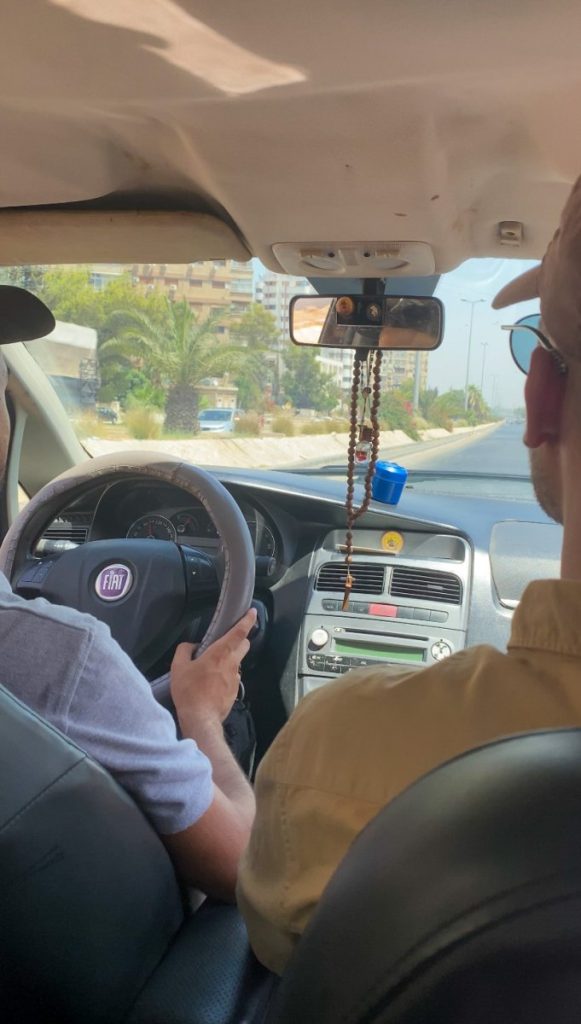
Most European countries have yet to resume direct commercial flights to Damascus. However, we were surprised to find out that on the same day we were arriving, there was indeed a direct flight from Athens. It was a very interesting (and a bit shocking, but in a good way) think to see before boarding on our own flight to Beirut.
The most common way people visit Syria is through Beirut , Lebanon. Once your flight arrives in Beirut, you’ll be greeted by a driver (arranged by the local tour operator of your choice) who will take you to the Lebanon-Syria border. The trip to the border lasted around one hour and a half, but it can take longer depending on the traffic.
Then, you will pass through customs on both the Lebanese and Syrian sides. This process is easy, and straightforward. You do not have to do anything, your driver will do the talking and take care of the procedure.
Once you pay the visa fee on the Syrian side and your passport gets stamped, another driver will be waiting for you to take you to Damascus. It took around 45 minutes to arrive to the capital city of Syria. Again, this whole procedure can take some time, depending on how many people are waiting to enter Syria and the traffic on the road.
Keep in mind as a general rule that this journey can last between 2.5 to 4 hours.
What is The Currency In Syria?
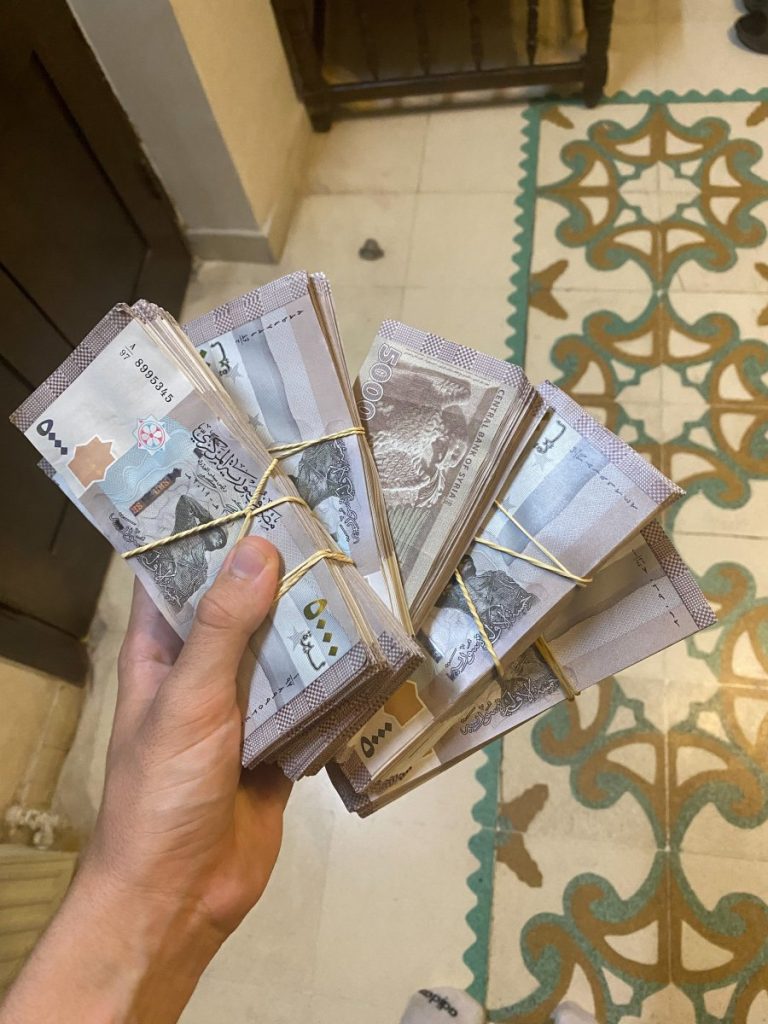
The currency used in Syria is called the Syrian pound (SYP) . It has a rich history dating back to the early 20th century when it was first introduced as the national currency.
All transactions inside the country have to be in the local currency. Generally you cannot use USD or Euros when traveling to Syria, but there are some exceptions.
The exchange rate can change very fast, even in a few days. When we traveled in August 2023, the rate was 1 USD= 15.000 Syrian pounds.
Is Syria Expensive?
Syria is actually a very affordable country to visit. It is for sure the cheapest country I have been to so far. A full traditional meal for 3-4 people at a middle-to-high-end restaurant will set you back around 15-20$ in total. A sandwich will cost around 1-2$, and a soda 1$ tops.
Small souvenirs like keychains etc., cost around 0.5$ per piece. As you can see, traveling to Syria on a budget can be very easy. However, there are more expensive and high-end options if you are a person who likes luxury and more expensive options.
Is Syrian Food Good?
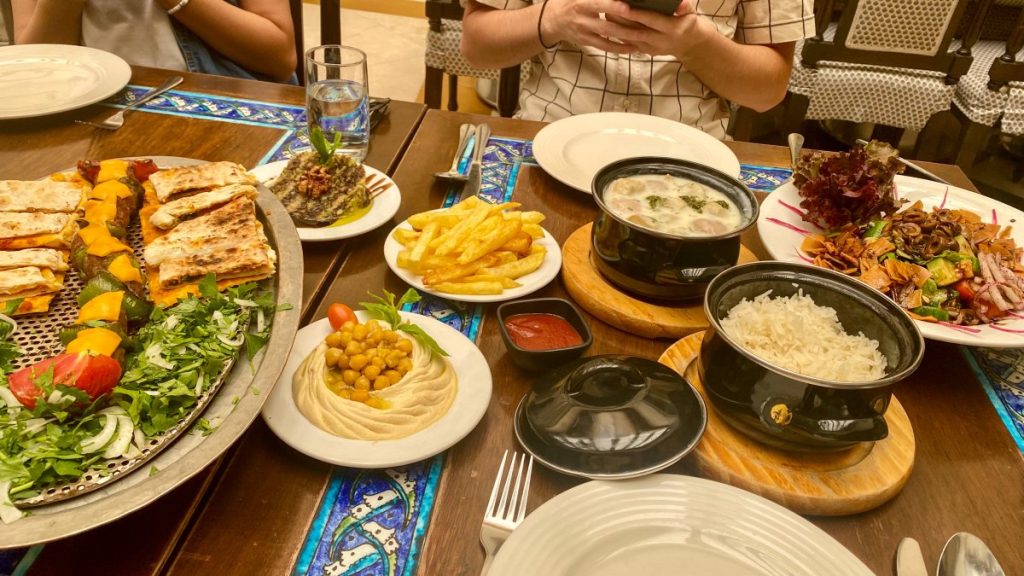
I am not kidding when I say that Syrian food is the best one I’ve ever had while traveling . Syrian cuisine is similar to the Lebanese one. It is a flavorful blend of Middle Eastern and Mediterranean influences, reflecting its rich history.
There is a great variety of traditional dishes that you just have to try! Popular dishes include shawarma, falafel, and kibbeh, while mezzes like hummus and tabbouleh are common starters. Syrian meals are best enjoyed with Arabic coffee or mint tea. It features fresh ingredients like olive oil, herbs, and spices, often combined with bulgur, rice, and grilled meats such as lamb and chicken.
From street food to middle-to-high end restaurant food, everything was always fresh and delicious. This is among the things that I miss the most when thinking about traveling to Syria.
What About Water In Syria?
I was very surprised (and I believe that you will be too) to find out that tap water in Syria is drinkable . Water comes from natural springs and is completely fine to drink. I would never expect that before traveling to Syria.
In fact, someone there told us that it is kind of illegal to bottle water and sell it. I am not sure if that is completely true, but that’s what we were told by locals.
Tips That Might Come In Handy When Traveling To Syria
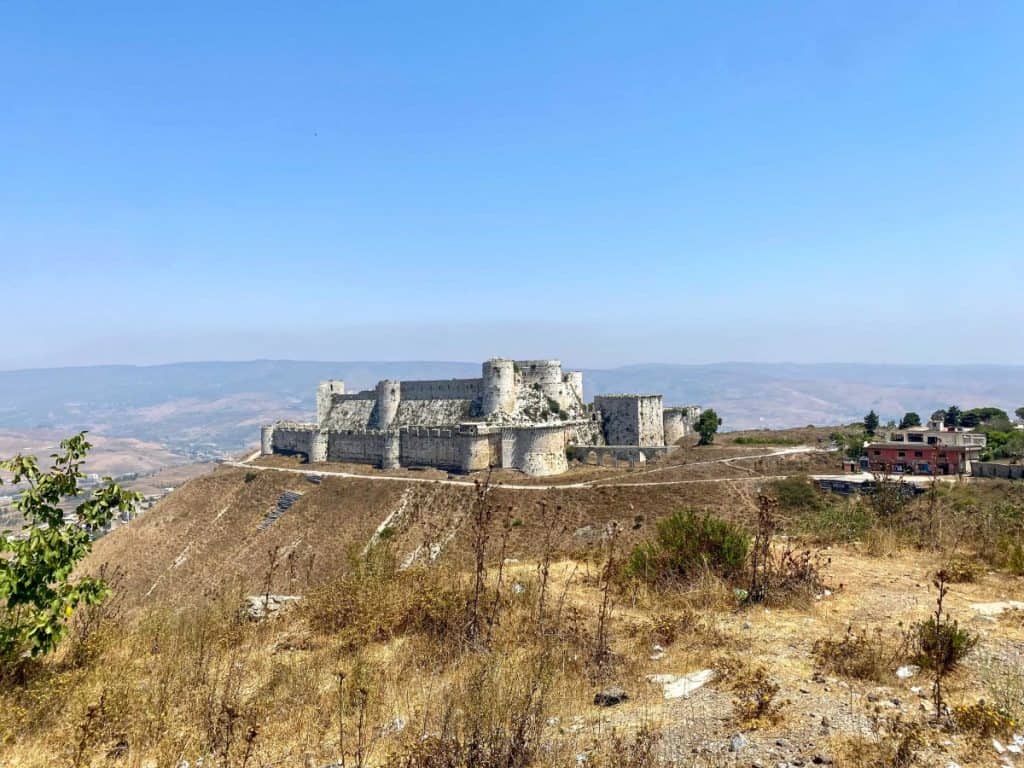
Before I conclude this article, I would like to give some tips that will possibly make it easier for you to organize your trip to Syria. Some of those things I wish I would have known before traveling to Syria. I hope they can be helpful for others too.
1. Do Your Research
I would advise you to do an extensive search on the places you’d like to visit. Learn about their history, from ancient times to the present. Don’t hesitate to read about the toll the war had on them. It is a way of appreciating more the luck you have by being able to visit them.
Look around to find the right travel agency ( Golden Team is still my suggestion), read reviews, and do not be afraid to ask people before you choose the best fit for you. Making the right decision will help you feel more comfortable and sure about traveling to Syria.
2. Always Listen To Your Guides
Guides in Syria are all licensed, well-educated, and know better when it comes to your safety. You should always be respectful to them and accept when they say that something is not possible.
Do not challenge them, and always remember they are doing their jobs. They just want to help you make the most out of your trip.
3. Get Travel Insurance.
This should go without saying in any trip in general. Most travel insurance companies, for obvious reasons, do not cover traveling to Syria. We used IATI insurance for our trip. We didn’t need to use their services, but they seemed reputable, and their fare was budget-friendly.
Another useful thing would be to always have a first aid kit with the necessary medicine with you. There is no guarantee that you’ll be able to find what you need in Syria.
4. Bring Enough Cash With You
Due to the sanctions, Syria’s banking system is not connected to the rest of the world. Syria is a cash-driven society. Keep in mind, as I stated above, that the only acceptable currency is the Syrian pound .
You should easily find places to exchange USD for Syrian pounds. Our driver told us that we would find a better rate in Lebanon but always get advise from your agency. USD generally has a much, much better rate than Euros in Syria , so if you are from Europe, exchange to USD before arriving in Lebanon.
Because there is no way to get money from abroad, have more cash in case of an emergency. There is no need to exchange all of them for Syrian pounds at one time, so keep a few extra bucks with you.
5. Always Be Aware Of Where You Are
You are traveling to Syria, a country still trying to recover from many years of war. Electricity is not always guaranteed. Your hotel will most probably have a generator on when power cuts occur (multiple times a day), but only the essential devices will be connected to it.
We could not get a SIM card because the power went down, and the system could not process our order. Those things can happen when you travel to such places, so be prepared and don’t get mad when such difficulties do occur.
6. Get A SIM Card
Internet in Syria is very slow and is not always guaranteed to work when power cuts happen. That’s why a SIM card with data can be lifesaving when traveling to Syria. We didn’t manage to get one for the reasons stated above, but I would surely recommend you try to get one.
Ask your guide about the best provider available. Cost shouldn’t be a problem, as the internet in Syria is very affordable.
7. Bring A Power Bank With You
As I said before, generators give electricity to only the necessary devices during power cuts. This does not always include plugs. That’s why having a power bank when traveling to Syria is a must.
My power bank had a capacity of 20,000 maH, which proved to be more than enough for a 6-day trip to the country. I don’t know what I would have done without it.
8. Engage With The Locals, But Respect Their Boundaries.
Syrians are very hospitable people who are eager to welcome you and tell you their stories. We had many people approaching us to engage in conversations. We started a few conversations, too. Some of the stories were sad, scary, and very emotional. It would be best if you always went with the flow.
See what someone is willing to share with you, as they may have a traumatized past. Do not put pressure, and always be respectful. Ask only for what you feel is appropriate, and I guarantee you will get to know many amazing and inspiring people.
9. Don’t Take Photos Of Checkpoints.
This is also something that you have to keep in mind before traveling to Syria. Generally, when traveling to Syria, you can take photos of everything except military buildings and checkpoints.
You should always respect this rule. You do not want to get yourself in unnecessary trouble. Of course, you can ask your guide if you are not sure about one place.
10. Spend Money, Really
This one might sound strange, but hear me out. The Syrian economy is a recycling one due to the sanctions. This means that foreign cash is very much needed; people need it.
Syrians are very proud. It is very possible that they will not accept money from you because they don’t want to be pitted. Unless you buy something from the business, they most likely won’t take any money. That’s why I would advise you to buy as many things as possible from multiple different stores, restaurants, or street food stands.
Syria is very cheap, and there are many cool things to take back home after traveling to Syria. That’s the best way to help Syrians, spending money on small and medium-scaled, local businesses.
Like every other Middle Eastern country, the tipping culture in Syria is deeply rooted. You should always tip when in cafes or restaurants. The tip does not have to be big, and will always be appreciated. Again, you will be helping workers and their families.
12. Don’t Bargain
Unlike other Middle Eastern countries, Syrians do not over-inflate their prices to foreigners. That’s why there will be no need to bargain when traveling to Syria. Prices will, most of the time, be honest and affordable. That’s cool, isn’t it?
13. Don’t Be Afraid, Enjoy
You most probably made a leap of faith when deciding to plan your trip to Syria. Try to overcome the feeling of fear that you might have before starting your trip. The country is beautiful, the people amazing, and the food is like nothing else.
You will have a fantastic time when traveling to Syria, but you must always have an open mind. It’s a trip of a lifetime, so make sure to enjoy it. You’ll come back with amazing stories to tell, that’s the only thing for sure!
Final Thoughts
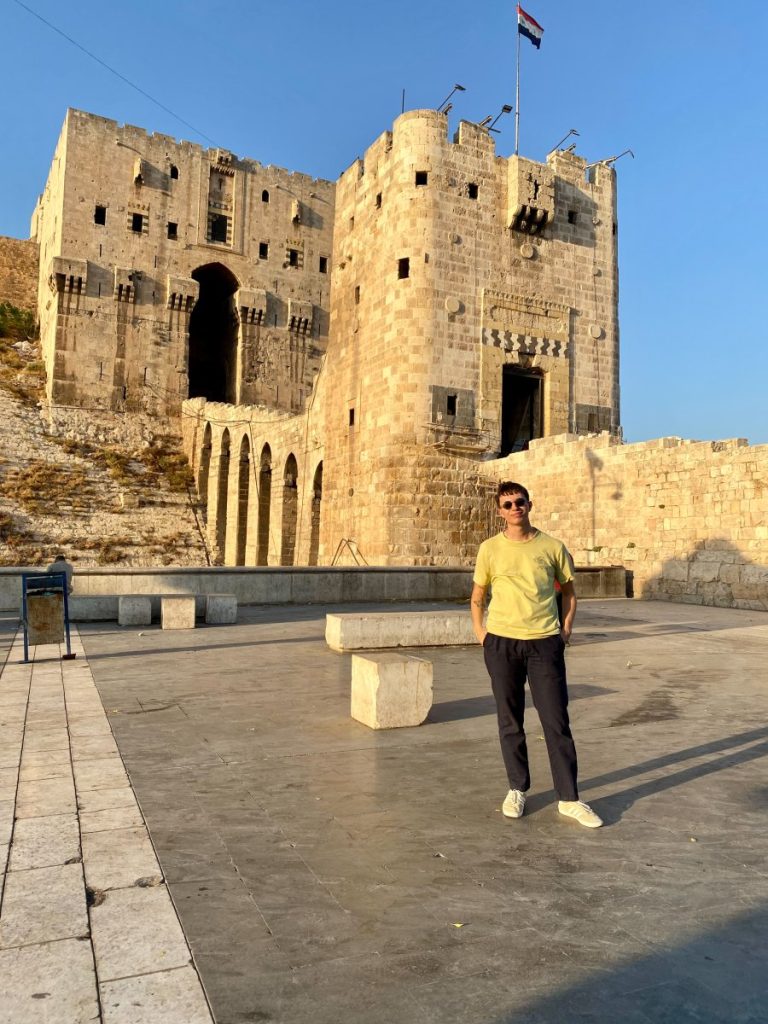
Traveling to Syria right now might sound tricky, but that is not necessarily the case. While the scars of the war can still be present, the country is trying to rebuild itself and leave the past behind. That’s the feeling I got after spending 6 days in this wonderful country.
Tourism can massively help the locals’ quality of life. Those people deserve to see their life coming back to normal; they need to feel trusted and get hope for a better future. Visiting them, helping their businesses, and letting them share their stories with you can be a massive step on this direction.
You May Also Like
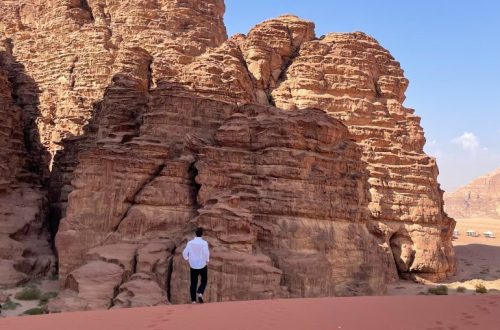
Why you should Plan a Trip to Wadi Rum in 2024
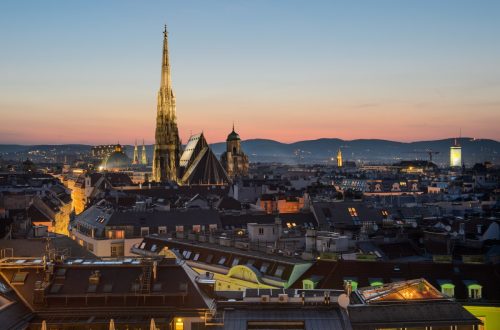
One Day in Vienna: 8 Amazing Things To Do
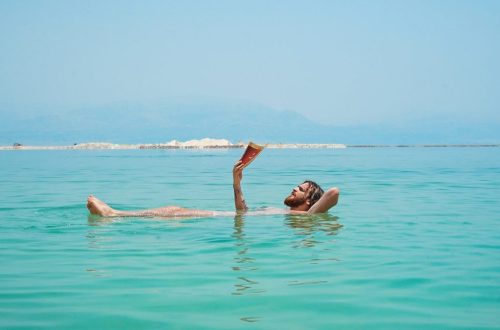
Why I Wouldn’t Visit the Dead Sea in Jordan Again
Leave a reply cancel reply.
Your email address will not be published. Required fields are marked *
Save my name, email, and website in this browser for the next time I comment.
clock This article was published more than 11 years ago
What it’s like to report on Syria: a Reddit I amA

The Washington Post's Liz Sly , has made several brief visits to Syria since the uprising began, and she shared her impressions with Reddit users Wednesday on the site's IAmA feature, a Q and A forum for people in unusual circumstances.
Here are highlights from the exchange, some of which have been edited:
Q. emjaiz : "The rebels [have] stated they wanted to overthrow Assad's oppressive regime and implement an Islamic government. What better would that do for the country? Is secularism in government looked down upon there?
A. Sly : The rebels in rural areas are definitely religious in a conservative sense, but Syrians in urban areas have a far more secular outlook, and there are also many minorities in Syria who will certainly not want an Islamic government. Because the government has been so repressive over the past 40 years, there is no tradition of politics outside government. So it is impossible to tell what the majority of people want, which is one reason why what is happening in Syria is so fascinating.
Q. freemarket27 : Why is Russia so worked up over keeping Assad in power? Is Russia concerned it is backing the losing side?
GET CAUGHT UP

70 years later, 1 in 3 Black people say integration didn’t help Black students

Journalists sue Chicago Tribune owner alleging pay discrimination

Abbott grants Daniel Perry pardon in murder of Black Lives Matter protester

NFL disavows Harrison Butker’s comments, cites commitment to inclusion

6 Airbnb red flags to spot before you make a booking mistake
A. Sly: I think for Russia this is about much more than Assad, or bases on the Mediterranean or any of the practical issues that link it to Syria. It is about the balance of power and who calls the shots, in the region and the world. For decades America has stood at the center of whatever has been happening in the Middle East (not always to its advantage, but it's been the key outside player). Now Russia is saying, we're still here, and you can't take our last regional ally. This will definitely work to Russia's disadvantage if Assad falls, but I think Russia sees it as an issue of principle, not pragmatism.
Q. rubenbs : Can you please elaborate why you find this more important than most other stories you've worked on in the last 20 years, including the fall of Saddam Hussein?
A. Sly : To recap what I wrote above, I feel Syria is more central to the region and how it operates than Saddam was. The Iraq invasion was as much about America, its ambitions and ability to project power as it was about Iraq. Iraq was already isolated and weak when the Americans invaded; Syria is at the center of a web of alliances and enmities, including Iran, Hezbollah, Israel, Saudi Arabia, Russia and America. If the regime falls, those will be overturned in ways we cannot predict.
Q. SeriousBlack : How important is the defection of the Syrian prime minister and his statements today about the Assad regime crumbling on the inside?
A. Sly : It is, symbolically, very important; practically, less so. Civilian government officials have little influence over the real decisions being taken by Assad, his relatives and his friends and by the security apparatus. Indeed, the civilian government barely exists any more. But, it demonstrates that disaffection with the regime reaches into the highest echelons of society. [Prime Minister Riyad Hijab] was only appointed in June, and Assad must have assumed he was loyal then. It appears he wasn't, so who else?
Q. aarko: Are you working on the ground in Syria, or are you literally based in and working out of Beirut?
How do you feel your work is received by WaPo readers or, generally speaking, by readers in the West? Do you feel that there is sufficient focus on the Syrian revolt from the general public?
A. Sly : I'm based in Beirut, and I mostly work here simply because it has been so difficult to get to Syria. I have been granted three, short official visas since the uprising began, the last one in January. It has recently become easier to sneak into Syria, so I did visit northern Syria last month, and I hope to be going back soon. I feel my stories have been generally well received by readers, but I think it is clear that the Syrian revolt has not captured people's imaginations in the way that the Libyan and Egyptian ones did. The challenge is to find ways to write about it that people will find interesting because it is very important and it is going to have profound consequences.
More world news coverage:
- Pakistani Hindus flee to India
- Militants storm Pakistani air base
- Geithners of Zeulenroda, Germany
- Read more headlines from around the world

Security Alert May 17, 2024
Worldwide caution, update may 10, 2024, information for u.s. citizens in the middle east.
- Travel Advisories |
- Contact Us |
- MyTravelGov |
Find U.S. Embassies & Consulates
Travel.state.gov, congressional liaison, special issuance agency, u.s. passports, international travel, intercountry adoption, international parental child abduction, records and authentications, popular links, travel advisories, mytravelgov, stay connected, legal resources, legal information, info for u.s. law enforcement, replace or certify documents.
Before You Go
Learn About Your Destination
While Abroad
Emergencies
Share this page:
Travel Advisory July 13, 2023
Syria - level 4: do not travel.
Reissued with obsolete COVID-19 page links removed.
Do not travel to Syria due to terrorism, civil unrest, kidnapping, armed conflict, and risk of unjust detention .
Country Summary: The U.S. Embassy in Damascus suspended its operations in February 2012. The Czech Republic serves as the protecting power for the United States in Syria. The U.S. government is unable to provide any emergency services to U.S. citizens in Syria.
Syria has experienced active armed conflict since 2011. No part of Syria is safe from violence. Kidnappings by armed groups, unjust arrests and/or detentions, the use of chemical warfare, shelling, and aerial bombardment of civilian centers pose significant risk of death or serious injury. The destruction of infrastructure, housing, medical facilities, schools, and power and water utilities has also increased hardships inside the country.
The U.S. government particularly warns private U.S. citizens against traveling to Syria to engage in armed conflict. U.S. citizens who undertake such activity face extreme personal risks, including kidnapping by armed groups, unjust arrests, injury, or death. The U.S. government does not support this activity. Our ability to provide consular assistance to individuals who are injured or kidnapped, or to the families of individuals who die in the conflict, is extremely limited.
Protests and demonstrations are quelled by government forces through aggressive tactics and protestors, activists, and political dissenters are routinely detained without access to legal representation or communications with friends and family.
Terrorist groups are active in Syria. Parts of Syria have experienced recent increases in incidents of bombings, IEDs, and assassinations. Fighting on behalf of or providing other forms of support to designated terrorist organizations, including ISIS and al-Qaeda affiliates, can constitute the provision of material support for terrorism, which is a crime under U.S. law that can result in penalties including prison time and large fines.
There is an ongoing risk of kidnapping and detentions of U.S. citizens and Westerners throughout the country. U.S. citizens remain a target. U.S. citizens are also targets of abduction and/or unjust detention by the Syrian government and while in detention do not have access to due process or medical attention. Government detention centers are known to be unsanitary facilities where widespread cruel, inhumane, or degrading treatment of detainees has been documented, as well as torture and extrajudicial killings. Minors, persons with physical, sensory, or mental disabilities, and elderly have frequently been victims of unjust detention. The Syrian government has also been implicated in the enforced or involuntary disappearance of more than 100,000 citizens, including medical and humanitarian workers, journalists, human rights activists, political opposition, and additionally those suspected of affiliation with these groups and their family members. Note: Only the Syrian government can issue a valid entry visa to Syria. Failure to obtain a legitimate entry visa directly from the Syrian government could result in detention.
Due to risks to civil aviation operating within or in the vicinity of Syria, the Federal Aviation Administration (FAA) has issued a Notice to Air Missions (NOTAM) and/or a Special Federal Aviation Regulation (SFAR) , which says that heightened military activity associated with the Syrian conflict may result in the risk of GPS interference, communications jamming, and errant long-range surface to air missiles straying into adjacent airspace within 200 nautical miles of the Damascus Flight Information Region. These activities may inadvertently pose hazards to civil aviation transiting the region. It also has the potential to spill over into the adjacent airspace managed by neighboring states and eastern portions of the Mediterranean Sea.
Read the country information page for additional information on travel to Syria.
If you decide to travel to Syria:
- Visit our website on Travel to High Risk Areas .
- Draft a will and designate appropriate insurance beneficiaries and/or power of attorney.
- Discuss a plan with loved ones regarding care/custody of children, pets, property, belongings, non-liquid assets (collections, artwork, etc.), funeral wishes, etc.
- Share important documents, login information, and points of contact with loved ones so that they can manage your affairs if you are unable to return as planned to the United States. Leave DNA samples with your medical provider in case it is necessary for your family to access them.
- Establish your own personal security plan in coordination with your employer or host organization or consider consulting with a professional security organization.
- Develop a communication plan with family and/or your employer or host organization so that they can monitor your safety and location as you travel through high-risk areas. This plan should specify who you would contact first, and how they should share the information.
- Enroll your trip in the State Department's Smart Traveler Enrollment Program (STEP) to receive Alerts and make it easier to locate you in an emergency.
- Follow the Department of State on Facebook and Twitter .
- Visit the CDC page for the latest Travel Health Information related to your travel.
- U.S. citizens who travel abroad should always have a contingency plan for emergency situations. Review the Traveler’s Checklist .
Embassy Messages
View Alerts and Messages Archive
Quick Facts
Must be valid at time of entry
One page required for entry stamp
Embassies and Consulates
The U.S. Department of State strongly recommends that U.S. citizens remaining in Syria depart immediately. More information can be found in the U.S. Department of State’s Syria Travel Advisory . The U.S. Embassy in Damascus suspended operations in February 2012 and therefore cannot provide protection or routine consular services to U.S. citizens who choose to travel to or remain in Syria despite the Travel Advisory.
The Government of the Czech Republic, acting through its Embassy in Damascus, serves as Protecting Power for U.S. interests in Syria. The range of consular services the Czech Republic provides to U.S. citizens is extremely limited. U.S. citizens in Syria who seek consular services should contact the U.S. Interests Section of the Embassy of the Czech Republic in Damascus at [email protected] .
U.S. citizens in Syria who are in need of emergency assistance, and are unable to reach the U.S. Interests Section of the Embassy of the Czech Republic or must make contact outside business hours, should contact the U.S. Embassy in Amman, Jordan: Telephone: 962 (6) 590-6950 Emergencies: 962 (6) 590-6500 E-mail: [email protected]
U.S. citizens may also call 1-888-407-4747 (from the U.S.) or +1 202-501-4444 (from overseas) for assistance.
Destination Description
See the Department of State’s Fact Sheet on Syria for information on U.S.-Syria relations.
Entry, Exit and Visa Requirements
A passport and a visa are required. Visas must be obtained prior to arrival in Syria from a Syrian diplomatic mission located in the traveler’s country of residence. The Embassy of the Syrian Arab Republic in Washington, D.C., suspended all operations, including consular services on March 18, 2014, and Syria does not have a protecting power currently providing consular services - on its behalf - in the United States.
Foreigners who wish to stay 15 days or more in Syria must register with Syrian immigration authorities by the 15th day of their stay.
Syria charges a departure tax at its land and sea borders for all visitors except those on diplomatic passports and children under the age of 11.
Israel Travel: The Syrian government rigidly enforces restrictions on prior travel to Israel and does not allow persons with passports bearing Israeli visas or entry/exit stamps to enter the country. Likewise, the absence of entry stamps from a country adjacent to Israel, that a traveler is attempting to enter Syria from, will cause Syrian immigration officials to refuse admittance. Overland entry into Syria directly from Israel is not possible. U.S. citizen travelers suspected of having traveled to Israel have been detained for questioning.
Dual Nationality: U.S. citizen males over the afe of 18 holding dual Syrian citizenship or non-dual U.S. citizen males of Syrian origin, even those born in the United States, may be subject to compulsory military service unless they receive a temporary or permanent exemption from a Syrian diplomatic mission abroad prior to their entry into Syria. U.S. citizen males in Syria could face detention and compulsory service if they have not yet completed military service or paid exemption fees.
A child under the age of eighteen whose father is Syrian or is of Syrian descent must have his/her father’s permission to leave Syria, even if the parents are separated or divorced and the mother has been granted full custody by a Syrian court. On occasion, the families of U.S.-Syrian dual-national women visiting Syria have attempted to prevent them from leaving the country, generally in order to compel the woman to marry. Although under Syrian law a woman wishing to depart Syria does not need her husband's explicit consent in every instance , a Syrian husband may take legal action to prevent his wife from leaving the country, regardless of her nationality. Once such legal orders are in place, the U.S. government cannot help U.S. citizens leave Syria.
Some HIV/AIDS entry restrictions exist for visitors or foreign residents of Syria. HIV/AIDS tests are mandatory for foreigners from ages 15 to 60 who wish to reside in Syria. The HIV/AIDS test must be conducted in Syria at a facility approved by the Syrian Ministry of Health. A residence permit will not be issued until the applicant is determined HIV negative. Foreigners wishing to marry Syrian nationals in Syria must also be tested for HIV. Please verify this information with the Syrian government before you travel.
Find information on dual nationality , prevention of international child abduction , and Customs Information on our websites.
Safety and Security
The Department of State continues to warn U.S. citizens against travel to Syria and strongly recommends that U.S. citizens remaining in Syria depart immediatley, if they are able to depart safely, per the U.S Department of State's Syria Travel Advisory . Over the past twelve years, the Syrian regime has committed and continues to commit a wide range of atrocities, some of which constitute war crimes and crimes against humanity. Violent conflict between government and anti-government groups continues throughout the country.
Syrian regime military operations have involved the use of ballistic missiles, aerial attacks, heavy artillery, and chemical weapons that have struck civilian populations and infrastructure. Attacks from the regime or other groups could happen with little or no warning. No part of Syria should be considered immune from violence, and the potential exists throughout the country for unpredictable and hostile acts, including kidnappings, sniper assaults, terrorist attacks, small arms fire, improvised explosives, artillery shelling, airstrikes, the use of chemical weapons, large and small-scale bombings, as well as unjust arrest, detention, torture, sexual and gender-based violence, and extrajudicial killings.
Terrorism: Terrorist groups and those inspired by such organizations are intent on attacking U.S. citizens abroad. Terrorists are increasingly using less sophisticated methods of attack – including knives, firearms, and vehicles – to more effectively target crowds. Frequently, their aim is unprotected or vulnerable targets, such as:
- High-profile public events (sporting contests, political rallies, demonstrations, holiday events, celebratory gatherings, etc.)
- Hotels, clubs, and restaurants frequented by tourists
- Places of worship
- Shopping malls and markets
- Public transportation systems (including subways, buses, trains, and scheduled commercial flights)
Syria has been designated as a State Sponsor of Terrorism since 1979 and has given support to a variety of terrorist groups, affecting the stability of the region. Terrorists often do not distinguish between U.S. government personnel and private U.S. citizens. Terrorists may target areas frequented by Westerners, such as tourist sites, hotels, restaurants, and other frequently visited areas. U.S. citizens still in Syria are strongly encouraged to depart Syria immediately. U.S. citizens who choose to remain despite this warning should maintain a high level of vigilance and be aware of their surroundings. It is especially important for travelers to be unpredictable in their movements by varying times and routes and maintaining a low profile.
Elements within the regime as well as non-state actor groups maintain anti-U.S. or anti-Western sentiment, which may intensify following significant events in the region, particularly those related to U.S.-Syria relations, international intervention in the ongoing conflict, Israeli-Palestinian issues, the status of Jerusalem, and clashes in Lebanon. The combination of terrorist organizations, a porous border with Iraq and long-standing border issues with all of its neighbors (Jordan, Lebanon, Iraq, Türkiye, and Israel) have made Syria a destabilizing factor in the region and a potential target for reprisal.
For more information, see our Terrorism page.
Crime: Since the suspension of operations of the U.S. Embassy in Damascus in February of 2012, the U.S. government has not been able to provide accurate information about crime involving U.S. citizens visiting or living in Syria. The Department of State strongly recommends that U.S. citizens remaining in Syria depart immediately.
Demonstrations occur frequently. They may take place in response to political or economic issues, on politically significant holidays, and during international events.
- Demonstrations can be unpredictable, avoid areas around protests and demonstrations.
- Demonstrations have turned violent.
- Check local media for updates and traffic advisories.
International Financial Scams: See the Department of State and FBI pages for more information.
Internet romance and financial scams are prevalent in Syria. Scams are often initiated through Internet postings/profiles or by unsolicited emails and letters. Scammers almost always pose as U.S. citizens who have no one else to turn to for help. Common scams include:
- Romance/Online dating
- Money transfers
Victims of Crime: If you or someone you know becomes the victim of a crime abroad, you should contact the nearest U.S. embassy or consulate. The Czech Republic, through the U.S. Interests Section of the Czech Embassy in Damascus, currently serves as the Protecting Power for U.S. interests in Syria; however, their ability to provide services is extremely limited.
See our webpage on help for U.S. victims of crime overseas .
The U.S. Interests Section, in coordination with nearby U.S. embassies and consulates, may be able to:
- Help you find appropriate medical care
- Assist you in reporting a crime to the police
- Contact relatives or friends with your written consent
- Explain the local criminal justice process in general terms
- Provide our information on victim’s compensation programs in the U.S.
- Provide an emergency loan for repatriation to the United States and/or limited medical support in cases of destitution
- Help you find accommodation and arrange flights home
- Assist you to replace a stolen or lost passport
The local equivalents to the “911” emergency line in Syria is 110 for ambulance, 113 for fire, and 112 for the police. Syrian operators do not usually speak English and contact with security services has the potential to result in unjust arrest, detention, or disappearance.
Domestic Violence: U.S. citizen victims of domestic violence may contact the U.S. Interests Section of the Czech Embassy or U.S. Embassy Amman for assistance.
Tourism: No formal tourism industry infrastructure is in place. Tourists are considered to be participating in activities at their own risk. Emergency response and subsequent appropriate medical treatment is not available in-country. U.S. citizens are encouraged to purchase medical evacuation insurance .
Syrian Conflict: The Syrian Arab Republic is ruled by an authoritarian regime dominated by the Socialist Ba'ath Party currently engaged in an armed conflict with the armed Syrian opposition.
Sources estimate that the conflict has resulted in over 500,000 deaths with hundreds of thousands more wounded, unjustly detained, or forcibly disappeared. The Syrian conflict has resulted in over 5.6 million registered Syrian refugees, and approximately 6.9 million people are displaced inside Syria, while 4.53 million remain in hard-to-reach and besieged areas. The Syrian government and its partners continue to prohibit the free flow of humanitarian aid into besieged areas, resulting in severe food shortages. More than 14 million people in Syria need humanitarian assistance.
Since September 2014, the U.S. government and others in the Defeat-ISIS Coalition have conducted military strikes on Syrian territory.
Entities Operating in Syria: The Syrian government has regained control over most of the country, but some competing entities maintain greater control and influence in areas of northern Syria. Additionally, areas of southern Syria controlled by the Syrian government are constantly challenged by armed groups. Some armed groups have used car bombs, improvised explosive device/indirect-fire attacks, sniper fire, and carried out kidnappings throughout the country. Foreign combatants – including members of Iranian-aligned militia groups, Hizballah fighters, violent Islamist extremists, and al-Qa'ida (AQ) elements – are also participating in hostilities. Additionally, Türkiye has become increasingly involved in military operations throughout northern Syria, seeking to counter the influence of the Kurdistan Worker’s Party (PKK), a designated terrorist organization.
Hayat Tahrir al-Sham (HTS), formerly known as al-Nusrah Front, an AQ affiliate and designated terrorist organization, has consolidated power in the northwestern province of Idlib. HTS control over Idlib threatens the ability of NGOs and states to deliver humanitarian aid to Syrians living there. Russian and/or Syrian government forces continue to conduct airstrikes in Idlib province. Strikes have resulted in civilian fatalities, including of medical personnel, children, and internally displaced persons and caused significant damage to civilian infrastructure such as medical facilities, schools, markets, and civilian housing.
ISIS no longer controls territory in Syria but continues to operate as an insurgency throughout the country. ISIS continues to pose a significant threat to civilians residing in Syria and has demonstrated the ability to conduct coordinated attacks against armed actors and civilians. Tactics of ISIS, HTS, and other violent extremist groups include the use of suicide bombers, kidnapping, small and heavy arms, improvised explosive devices, and chemical weapons. They have targeted major city centers, road checkpoints, border crossings, government buildings, energy infrastructure, shopping areas, and open spaces in Damascus, Aleppo, Hamah, Dara, Homs, Idlib, and Dayr al-Zawr provinces. These groups have murdered and kidnapped U.S. citizens, both for ransom and political purposes; in some instances, U.S. citizens have disappeared within Syria. The U.S. government’s ability to help U.S. citizens kidnapped or taken hostage is very limited.
Chemical Weapons: The Syrian regime has repeatedly used chemical weapons, including the nerve agent sarin and chlorine gas, against civilians. ISIS has also conducted several sulfur mustard attacks in Syria. Although there has not been a documented chemical weapons attack in Syria since May 2019, the continuing violence, security situation, and ongoing concerns about Syria’s remaining chemical weapons capabilities contributes to a volatile situation.
Kidnapping, Hostage Taking, and Forced Disappearance: There is an ongoing, high risk of kidnapping or hostage taking of U.S. citizens and other foreign nationals throughout the country. U.S. citizens remain a specific target, with several high-profile abductions having occurred since mid-2012. U.S. citizen victims have had diverse professional backgrounds, including journalism and humanitarian work. U.S. citizens held captive by ISIS have been murdered by the group, which released videos of killings and publicly took responsibility for their deaths. U.S. citizens also have been abducted by other individuals and groups in Syria, and from various locations, including Damascus and Aleppo. Other U.S. citizens have gone missing and are believed to have been kidnapped or taken hostage. Forced disappearance is also used by government security forces on a massive scale to spread fear, stifle dissent, and as punishment.
Borders: A porous border with Iraq, and long-standing border issues with Iraq, Jordan, Lebanon, Türkiye, and Israel, have contributed to a complex security environment in Syria, compounded by a protracted violent conflict and influx of foreign fighters. Since 2012, there have been multiple reports of Syrian shelling of neighboring countries near border areas, most significantly in Lebanon, Türkiye, Israel, and Jordan.
U.S. citizens should increase their vigilance if they travel within Syria to border areas with Israel or the Al-Jazira (eastern Syria) region. The Government of Türkiye severely restricts crossings of its border with Syria, limited exclusively to individuals working for organizations engaged in the authorized provision of humanitarian assistance. Individuals seeking emergency medical treatment or safety from immediate danger are assessed on a case-by-case basis.
U.S. citizens have reported facing dangers traveling within the country and when trying to leave Syria via land borders, given the diminished availability of commercial air travel out of Syria. Opposition-held border checkpoints should not be considered safe, as they are targeted by regime attacks and some armed groups have sought funding through kidnappings for ransom. Border areas are frequent targets of shelling and other attacks and are crowded because of internally-displaced persons. Errant attacks will occasionally hit border towns just outside the borders as well.
Engaging in Armed Conflict: The U.S. government particularly warns U.S. citizens against traveling to Syria to engage in armed conflict. U.S. citizens who undertake such activity face extreme personal risks, including kidnapping, injury, or death. The U.S. government does not support this activity, and our ability to provide consular assistance to individuals who are arrested, injured, or kidnapped, or to the families of individuals who die in the conflict, is extremely limited. Individuals who demonstrate an interest in groups opposing ISIS, including on social media, could open themselves to being targeted by ISIS itself, especially if those individuals travel to Syria.
Fighting on behalf of or providing other forms of financial and material support to designated terrorist organizations, including ISIS and HTS/al-Nusrah Front, is a crime under U.S. law that can result in penalties including prison time and large fines.
Detention Issues: U.S. citizens are also targets of abduction and detention by the Syrian regime. Family members seeking to obtain information about their missing or detained loved ones themselves face risk of detention, abuse, and exploitation when inquiring directly with the regime. Detainees are often held in detention centers for years under harsh and unsanitary conditions without any information provided to their loved ones on their status. These conditions allow for the quick spread of various illnesses. Pervasive abuse of detainees has been documented in government detention centers, including sexual and gender-based violence as well as other forms of physical violence, and extrajudicial killings. Please see our Human Rights report regarding these conditions.
Government Surveillance: The Syrian government conducts intense physical and electronic surveillance of both Syrian citizens and foreign visitors on a domestic and global scale. Any encounter with a Syrian citizen could be subject to scrutiny by the General Intelligence Directorate (GID) or other security services. Sustained interactions with average Syrians - especially if deemed to be of a political nature - may subject you and/or that Syrian to harassment and/or detention, and other forms of repressive actions by state security elements. Hotel rooms, internet connections, telephones, and fax machines may be monitored, and personal possessions in hotel rooms may be searched. The regime has reportedly planted spyware and other malware in Android applications to target human rights activists, opposition members, and journalists. Loitering or taking photographs of anything that could be perceived as being of military or security interest may result in questioning, confiscation of the images, or detention by security services. Additionally, U.S. citizens should be aware that conversations on the topics of politics, religion, and other social issues could lead to arrest. It is also illegal in Syria to possess specific-use electronic devices including GPS, short-wave or handheld radio equipment, or similar devices.
Local Laws & Special Circumstances
Criminal Penalties: You are subject to local laws. If you violate local laws, even unknowingly, you may be expelled, arrested, or imprisoned.
For example, under the Narcotics Act, article 39, Syria imposes the death penalty for drug trafficking or cultivation.
Women who are arrested under suspicion of immoral behavior (e.g., being alone in a room with a man who is not the woman’s husband or being in a residence where drugs or alcohol are being consumed) may be subjected to a virginity test. In addition, the Syrian government monitors the activities of all groups, including religious groups, and discourages proselytizing, which it deems a threat to relations among religious groups.
Some laws are also prosecutable in the U.S., regardless of local law. For examples, see our website on crimes against minors abroad and the Department of Justice website.
Arrest Notification: Syrian authorities generally do not notify the U.S. Interests Section of the arrest of a U.S. citizen until weeks after the arrest, if at all. Moreover, in previous cases security officials have not responded to U.S. requests for consular access, especially in cases of persons detained for “security” reasons. See our webpage for further information on consular notification and access.
Military Service: U.S.-Syrian and U.S.-Palestinian men who have never served in the Syrian military and who are planning to visit Syria despite the U.S. Department of State’s Syria Travel Advisory should contact the Syrian government prior to traveling concerning compulsory military service. See Dual National section above.
Special Circumstances: Syria is in the midst of a violent conflict. The Department of State strongly recommends that U.S. citizens remaining in Syria despite the U.S. Department of State’s Syria Travel Advisory depart immediately.
The destruction of infrastructure, housing, medical facilities, schools, and power and water utilities has increased hardships in Syria. Communications in Syria are difficult as phone and internet connections are unreliable.
Customs Requirements: Syrian customs authorities may enforce strict regulations concerning temporary importation into or export from Syria of items such as weapons, narcotics, alcohol, tobacco, cheese, fruit, pharmaceuticals, modems, cosmetics, and some electrical appliances. Please refer to our Customs Information page for additional information.
Banking and Commerce: Foreign currencies can be exchanged for Syrian pounds only by licensed money changers, the Commercial Bank of Syria (CBS), the Real Estate Bank, and at private banks, some of which maintain offices inside four and five star hotels.
Four and five star hotels and high-end stores in Syria generally accept credit cards, although most restaurants, stores and shops operate exclusively in cash.
Foreigners visiting Syria are required to pay hotel bills in U.S. dollars, Euros or other non-Syrian hard currency.
Traveler’s checks are not accepted in Syria and banks will not cash them unless the traveler has an account at the bank in question.
There are no U.S.-based banks operating in Syria.
There are 14 private banks operating in Syria, with branches and ATMs in most major cities. These ATMs usually honor major debit/credit systems.
U.S. banks are restricted by law from transacting business with the largest public bank in Syria, the CBS. Therefore, U.S. banks will not process ATM transactions from CBS branches.
Funds may be transferred into Syria through Western Union.
Wiring of funds through private banks is possible only if the traveler already holds an account with the bank in Syria; transferring funds through CBS or the Real Estate Bank is not possible because of U.S. sanctions. Private citizens seeking to transfer funds outside of Syria or to withdraw U.S. dollars from a bank in Syria should check with the relevant financial institution for the most up-to-date regulations.
Trade and Sanctions: The United States maintains a robust sanctions regime on Syria. The Syrian government is under comprehensive sanctions, including for its astrocities, some of which rise to the level of war crimes and crimes against humanity. Syria sanctions prohibit a wide range of transactions in Syria, including with sanctioned entities, unless authorized by the Department of the Treasury or the Department of Commerce. Please consult the Department of Treasury and Department of Commerce websites for more details.
Requests for specific licenses to authorize transactions that are neither exempt nor covered by a general license may be submitted to the Department of the Treasury’s Office of Foreign Assets Control (OFAC).
Terrorism List Government Sanctions Regulations prohibit U.S. persons from receiving unlicensed donations from the Syrian government. You can review the Department of Treasury’s Syria Sanctions page for more information.
Additionally, U.S. persons are prohibited from engaging in financial transactions which a U.S. person knows or has reasonable cause to believe pose a risk of furthering terrorist acts in the United States. For additional information about Terrorism List Government Sanctions Regulations, consult the terrorism brochure on the U.S. Department of the Treasury’s OFAC home page or via OFAC's info-by-fax service at (202) 622-0077.
Faith-Based Travelers: See our following webpages for details:
- Faith-Based Travel Information
- International Religious Freedom Report – see country reports
- Human Rights Report – see country report
- Hajj Fact Sheet for Travelers
- Best Practices for Volunteering Abroad
LGBTQI+ Travelers: Syrian law criminalizes consensual same-sex conduct under penal code article 520, which states that each sexual act "against the order of nature" is punishable by as long as three years imprisonment. Rather than prosecute under that law, however, the regime has arrested dozens of LGBTQI+ persons on charges such as abusing social values; selling, buying, or consuming illegal drugs; or organizing and promoting “obscene” parties. Credible NGOs report that the Syrian regime uses detention centers to torture and commit acts of sexual and gender-based violence against suspected members of the LGBTQI+ community. Abuses include rape, forced nudity, and anal or vaginal “examinations.” Individuals perceived as LGBTQI+ report being sexually abused and harassed at checkpoints. Public reports indicate that ISIS and HTS murder individuals perceived to be LGBTQI+, inclusive of those accused of engaging in same-sex sexual conduct. See our LGBTQI+ travel information page and section 6 of our Human Rights report for additional information.
Travelers Who Require Accessibility Assistance: Syrian law protects persons with disabilities from discrimination in education, access to health, or provision of other state services; however, the government has not enforced these provisions. Sidewalks are generally unevenly paved and often blocked by parked cars. Stairs must be used to access many public buildings, restaurants, cafes, and other tourist spots.
Students: See our Students Abroad page and FBI travel tips .
Women Travelers: See our travel tips for Women Travelers .
Basic medical care and medicines are available in Damascus and some coastal areas, but not necessarily in other areas. Serious illnesses and emergencies may require evacuation to a neighboring country or Western medical facility. There are shortages of food, water, medicine, and medical supplies throughout Syria.
For emergency services in Syria, dial 110 for ambulance and 113 for fire.
Ambulance services are not present throughout the country, except in the capital and provincial cities.
The Department of State does not pay medical bills. Be aware that U.S. Medicare/Medicaid does not apply overseas. Most hospitals and doctors overseas do not accept U.S. health insurance.
Medical Insurance: Find out if your health insurance plan provides coverage overseas, though hospitals and doctors abroad may not accept it. Care providers in Syria only accept cash payments up front, and the cost for services can be expensive.
See our webpage for more information on insurance overseas.
Visit the U.S. Centers for Disease Control and Prevention for more information on type of insurance you should consider before you travel overseas.
The Department strongly recommends supplemental insurance to cover medical evacuation. In addition, you might wish to check whether your insurance will cover injuries sustained in a conflict zone.
If traveling with prescription medication, check with the Government of Syria to ensure that the medication is legal in Syria. Always carry your prescription medication in original packaging with your doctor’s prescription.
Vaccinations: Be up-to-date on all vaccinations recommended by the U.S. Centers for Disease Control and Prevention.
The following diseases are prevalent:
- Tuberculosis
- Hepatitis A
- Diarrheal disease
Further health information:
- World Health Organization
- U.S. Centers for Disease Control and Prevention (CDC)
Air Quality: Visit AirNow Department of State for information on air quality at U.S. Embassies and Consulates.
Travel and Transportation
Road Conditions and Safety: Excercise caution if driving in Syria because road conditions are hazardous and there are threats generated by the active conflict.
Visitors may encounter hostile activity, harassment, or even abduction at both official and unofficial security checkpoints on roads throughout the country.
Although drivers generally follow traffic signs and signals in urban centers, they maneuver aggressively and show little regard for vehicles traveling near them. Lane markings are usually ignored. Unlike in the United States, vehicles within Syrian traffic circles must give way to entering traffic. At night, it is very difficult to see pedestrians, who often walk into traffic with little warning. Outside major cities, it is common to find pedestrians, animals and vehicles on unlighted roads at night.
Pedestrians should also exercise caution. Parked cars, deteriorating pavement, and guard posts obstruct sidewalks, often forcing pedestrians to walk in the street. Vehicles often do not stop for pedestrians, and regularly run red lights or “jump” the green light well before it changes. Drivers and passengers are subject to demands for money, harassment and abduction throughout the country. Rule of law, including traffic laws, and law enforcement is absent in many areas of the country.
See our Road Safety page for more information.
Aviation Safety Oversight:
Because of the risks to civil aviation operating within or in the vicinity of Syria, the Federal Aviation Administration (FAA) has issued a Notice to Air Missions (NOTAM) and/or a Special Federal Aviation Regulation (SFAR) that prohibits U.S. and codeshare flights from flying through Syrian airspace and advises caution for flights operating within 200 nautical miles.
For more information, U.S. citizens should consult the Federal Aviation Administration's Prohibitions, Restrictions, and Notices .
As there is no direct commercial air service to the United States by carriers registered in Syria, the U.S. Federal Aviation Administration (FAA) has not assessed the government of Syria’s Civil Aviation Authority for compliance with International Civil Aviation Organization (ICAO) aviation safety standards. Further information may be found on the FAA’s safety assessment page .
Maritime Travel: Mariners planning travel to Syria should also check for U.S. maritime advisories and alerts. Information may also be posted to the U.S. Coast Guard homeport website , and the NGA broadcast warnings website . Navigational warnings can be found under the "Current Warnings" section for the applicable NAVAREA from within the NGA site
Port Security: The Commandant of the Coast Guard has determined that effective anti-terrorism measures are not in place in Syrian ports and has imposed conditions of entry on vessels that arrive in U.S. ports having visited ports in Syria. Mariners and passengers on commercial vessels traveling through the ports of Syria should exercise increased caution.
For additional travel information
- Enroll in the Smart Traveler Enrollment Program (STEP) to receive security messages and make it easier to locate you in an emergency.
- Call us in Washington, D.C. at 1-888-407-4747 (toll-free in the United States and Canada) or 1-202-501-4444 (from all other countries) from 8:00 a.m. to 8:00 p.m., Eastern Standard Time, Monday through Friday (except U.S. federal holidays).
- See the State Department’s travel website for the Worldwide Caution and Travel Advisories .
- Follow us on Twitter and Facebook .
- See traveling safely abroad for useful travel tips.
Review information about International Parental Child Abduction in Syria . For additional IPCA-related information, please see the International Child Abduction Prevention and Return Act ( ICAPRA ) report.
Travel Advisory Levels
Assistance for u.s. citizens, learn about your destination, enroll in step.

Subscribe to get up-to-date safety and security information and help us reach you in an emergency abroad.
Recommended Web Browsers: Microsoft Edge or Google Chrome.
Make two copies of all of your travel documents in case of emergency, and leave one with a trusted friend or relative.
Afghanistan
Antigua and Barbuda
Bonaire, Sint Eustatius, and Saba
Bosnia and Herzegovina
British Virgin Islands
Burkina Faso
Burma (Myanmar)
Cayman Islands
Central African Republic
Cote d Ivoire
Curaçao
Czech Republic
Democratic Republic of the Congo
Dominican Republic
El Salvador
Equatorial Guinea
Eswatini (Swaziland)
Falkland Islands
France (includes Monaco)
French Guiana
French Polynesia
French West Indies
Guadeloupe, Martinique, Saint Martin, and Saint Barthélemy (French West Indies)
Guinea-Bissau
Isle of Man
Israel, The West Bank and Gaza
Liechtenstein
Marshall Islands
Netherlands
New Caledonia
New Zealand
North Korea (Democratic People's Republic of Korea)
Papua New Guinea
Philippines
Republic of North Macedonia
Republic of the Congo
Saint Kitts and Nevis
Saint Lucia
Saint Vincent and the Grenadines
Sao Tome and Principe
Saudi Arabia
Sierra Leone
Sint Maarten
Solomon Islands
South Africa
South Korea
South Sudan
Switzerland
The Bahamas
Timor-Leste
Trinidad and Tobago
Turkmenistan
Turks and Caicos Islands
United Arab Emirates
United Kingdom
Vatican City (Holy See)
External Link
You are about to leave travel.state.gov for an external website that is not maintained by the U.S. Department of State.
Links to external websites are provided as a convenience and should not be construed as an endorsement by the U.S. Department of State of the views or products contained therein. If you wish to remain on travel.state.gov, click the "cancel" message.
You are about to visit:
Cookies on GOV.UK
We use some essential cookies to make this website work.
We’d like to set additional cookies to understand how you use GOV.UK, remember your settings and improve government services.
We also use cookies set by other sites to help us deliver content from their services.
You have accepted additional cookies. You can change your cookie settings at any time.
You have rejected additional cookies. You can change your cookie settings at any time.
- Passports, travel and living abroad
- Travel abroad
- Foreign travel advice
Warnings and insurance
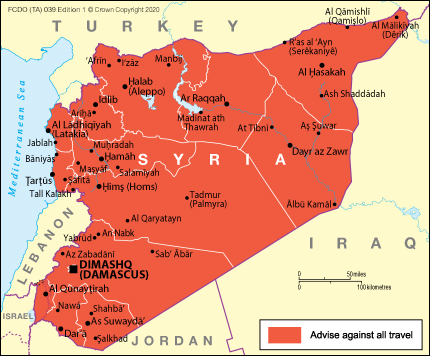
Your travel insurance could be invalidated if you travel against advice from the Foreign, Commonwealth & Development Office (FCDO).
FCDO advises against all travel to Syria
FCDO advises against all travel to Syria due to the ongoing conflict and unpredictable security conditions.
If you are a British national in Syria, leave the country by any practical means.
UK government support
There is no UK government support available in Syria, as all British Embassy services in Damascus are suspended. If you need help, call the FCDO in London on +44 (0)20 7008 5000.
Travel insurance
If you choose to travel against FCDO advice, research your destinations and get appropriate travel insurance . Insurance should cover your itinerary, planned activities and expenses in an emergency.
About FCDO travel advice
FCDO provides advice about risks of travel to help British nationals make informed decisions. Find out more about FCDO travel advice .
Follow and contact FCDO travel on Twitter , Facebook and Instagram . You can also sign up to get email notifications when this advice is updated.
Related content
Is this page useful.
- Yes this page is useful
- No this page is not useful
Help us improve GOV.UK
Don’t include personal or financial information like your National Insurance number or credit card details.
To help us improve GOV.UK, we’d like to know more about your visit today. Please fill in this survey (opens in a new tab) .

Search Smartraveller

Latest update
Do not travel to Syria due to the extremely dangerous security situation and the threat of armed conflict, air strikes, terrorism and kidnapping.
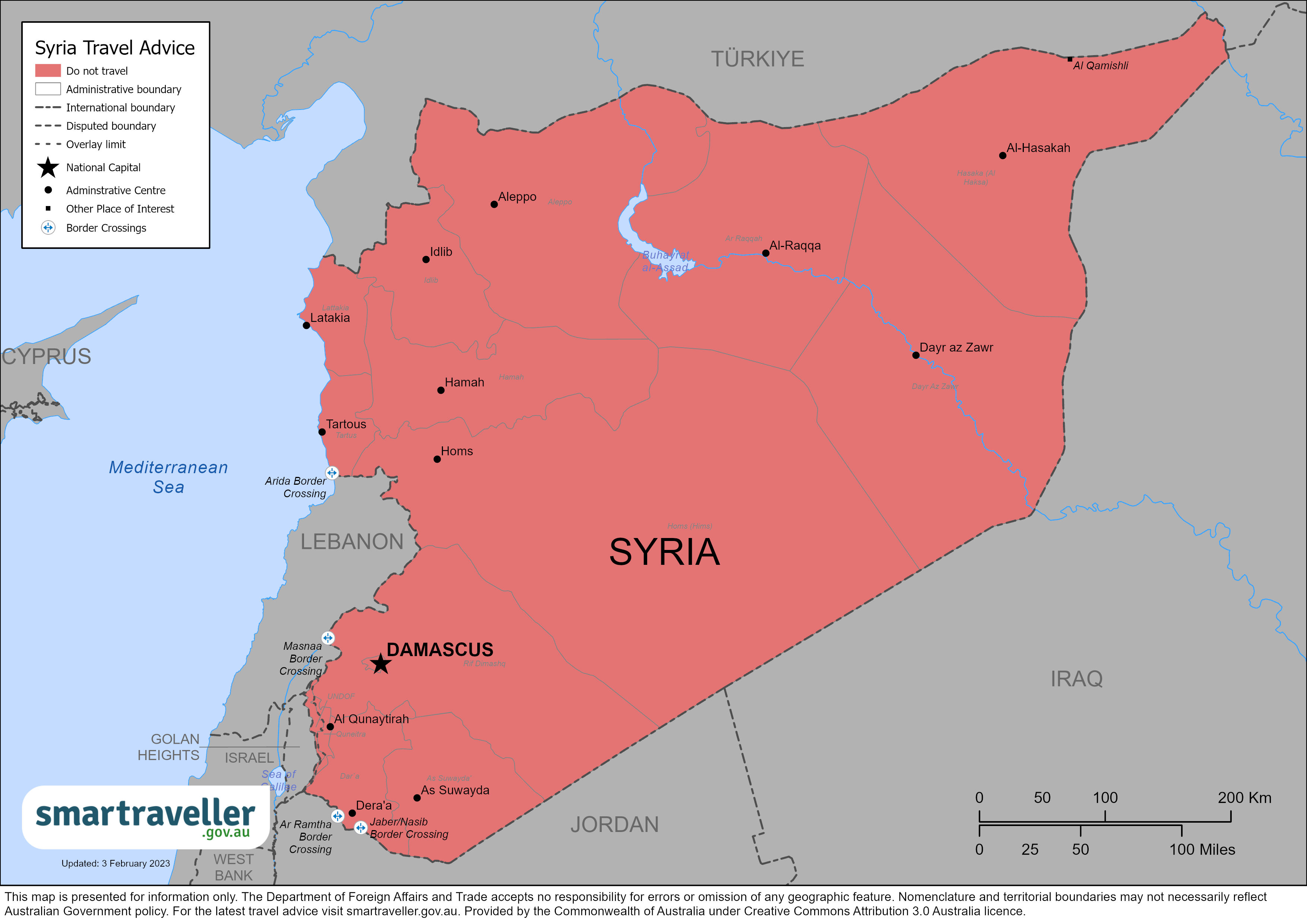
Syria (PDF 755.31 KB)
The Middle East (PDF 1.45 MB)
Local emergency contacts
Fire services, medical emergencies.
Call 110 or go direct to a hospital.
Call 112 or visit the nearest police station.
Advice levels
Do not travel to Syria.
Do not travel to Syria due to the extremely dangerous security situation and the threat of armed conflict, air strikes, terrorism and kidnapping.
See Safety .
- An increased threat of military and terrorist attacks against Israel and Israeli interests across the region and ongoing military action in the Occupied Palestinian Territories could lead to increased tensions in other locations in the Middle East. Demonstration and protest activity may occur, and localised security situations could deteriorate with little notice. Avoid all demonstrations and protests.
- This may also result in airspace closures, flight cancellations and flight diversions and other travel disruptions.
- The security situation in Syria is dangerous due to military conflict, air strikes, high levels of violence, terrorism and kidnapping. Chemical weapons have been used in the conflict. If you're in Syria, despite our advice, avoid possible terrorist and military targets. Seek professional security advice if you enter Syria. Limit your movements. Keep stocks of food, water, fuel and toiletries.
- Foreigners, especially aid workers and journalists, have been kidnapped. Vary your routines so your movements don't become obvious to others.
- Protests can turn violent. Authorities have arrested people near demonstrations, regardless of their citizenship. Avoid large public gatherings.
- Crime has increased, including violent robberies, kidnappings and carjackings. Keep your vehicle doors locked and windows up, even when moving. Carry only what you need.
Full travel advice: Safety
- Access to hospitals and medicine are limited due to the ongoing conflict. The quality of health care in Syria is low. If you're seriously ill or injured, you'll need medical evacuation. This is expensive and hard to organise. The Australian Government won't organise evacuation or pay for these costs.
- Insect-borne diseases, such as leishmaniasis, are common. Malaria occurs in the northern border region, particularly in Al Hasakah Province. Ensure your accommodation is insect-proof. Use insect repellent. Consider taking anti-malarial medication.
- Waterborne, foodborne, parasitic and other infectious diseases are common. These include brucellosis, typhoid and hepatitis. Drink only boiled or bottled water. Avoid raw or undercooked foods and unpasteurised dairy products.
Full travel advice: Health
- Don't use or carry drugs. Penalties for drug offences include the death sentence.
- Get professional legal advice if you're involved in local legal matters, especially family or business law.
- Be careful when taking photos. It's illegal to photograph military and government buildings and other sensitive infrastructure.
- Using a drone is illegal and could result in a severe penalty.
- Always carry ID. It's required by law.
- Syria recognises dual nationality. However, if you're an Australian-Syrian dual national, Syrian authorities will treat you as Syrian. If you're a male dual national, you may have to do military service if you go to Syria. Contact your nearest Syrian embassy or consulate for details.
- Same-sex relations are illegal in Syria.
Full travel advice: Local laws
- If you travel to Syria despite our advice and don't have Syrian identity documents, you'll need a visa. Entry and exit conditions can change at short notice. You should contact the nearest embassy or consulate of Syria for the latest requirements.
- Contact Lebanese and Syrian authorities for the latest information on travelling between Syria and Lebanon. Entry and exit measures may change without notice.
- Leave Syria as soon as you can. Most commercial airlines have stopped flying to Syria. Commercial air services and airports could be attacked or stop operating at any time. Roads and border crossings may be blocked without warning. Plan your exit carefully to minimise safety risks.
- Ongoing conflict in Syria may increase risks to civil aviation in the region. Civil aviation authorities in a number of countries do not allow airlines from those countries to fly in Syrian airspace.
- The local currency is the Syrian Pound (SYP). The economy is primarily cash-based. Penalties for carrying or using currencies other than the SYP are severe. Your credit cards and ATM cards may not work.
- The SYP continues to depreciate heavily and can drastically affect the cost of everyday goods. Ensure you have enough cash for your stay, including depreciation rates.
Full travel advice: Travel
Local contacts
- The Consular Services Charter details what we can and can't do to help you overseas.
- Australia doesn't have an embassy or consulate in Syria. Our ability to provide consular services in Syria is severely limited. The Romanian Embassy in Damascus may be able to provide some emergency consular services to Australians in Syria. For further information, contact the Australian Embassy in Beirut .
- To stay up to date with local information, follow the Embassy’s social media accounts.
Full travel advice: Local contacts
Full advice
Armed conflict and terrorism.
The security situation in Syria is dangerous due to:
- ongoing military conflict, including air strikes
- high levels of violence
- civil unrest and political tensions
- terrorist attacks
- kidnappings involving foreigners
Chemical weapons have been used during the conflict in Syria. These weapons could be used again.
If you're in Syria despite this advice, prepare to leave as soon as possible. Get a valid exit visa in your passport in case you need to depart quickly.
While you're in Syria you should:
- seek professional security advice
- adopt effective personal security measures
- stay in a safe place and limit your movements
- always be alert
- keep a low profile
- vary your routines so your movements don't become obvious to others
Take safety precautions, including:
- avoiding possible targets for a terrorist or military attack
- having a clear exit plan in case there's a security incident
If there's an attack:
- leave the area as soon as it's safe
- avoid the affected area in case of secondary attacks
- monitor the media for any new or emerging threats
The security situation means access to food, water and fuel can be difficult. You should stockpile essential goods, including toiletries and prescription medication.
Terrorism is a threat worldwide.
More information:
Foreigners have been kidnapped in Syria. Kidnappers often kill hostages.
In the past few years, aid workers and journalists have been kidnapped.
The Australian Government's longstanding policy is that it doesn't make payments or concessions to kidnappers.

Civil unrest and political tension
The security situation in the region remains unpredictable and could deteriorate with little or no warning.
Public protests and events with large groups of people can turn violent.
Syrian authorities have arrested people near demonstrations, regardless of their citizenship.
Civil unrest may limit your ability to travel by road.
If you're in Syria despite our advice:
- avoid rallies, demonstrations and crowds
- avoid funerals and mourning processions
- avoid areas where people congregate after Friday midday prayers
- monitor the media for new safety and security risks, including political events that could increase tensions
- Demonstrations and civil unrest
The breakdown in law and order has led to an increase in crime, including:
- violent robberies
- kidnappings
- carjackings
- drive with your doors locked and windows up
- secure your accommodation
- stay alert to your surroundings
Cyber security
You may be at risk of cyber-based threats during overseas travel to any country. Digital identity theft is a growing concern. Your devices and personal data can be compromised, especially if you’re connecting to Wi-Fi, using or connecting to shared or public computers, or to Bluetooth.
Social media can also be risky in destinations where there are social or political tensions, or laws that may seem unreasonable by Australian standards. Travellers have been arrested for things they have said on social media. Don't comment on local or political events on your social media.
Cyber security when travelling overseas
Climate and natural disasters
Syria is subject to earthquakes . Dust storms and sandstorms also happen, especially during the summer months when there have been long periods of dry weather.
If there's a natural disaster or severe weather :
- secure your passport in a safe, waterproof location
- monitor local media and other sources such as the Global Disaster Alert and Coordination System
- follow the advice of local authorities
- keep in contact with friends and family
Travel insurance
Get comprehensive travel insurance before you leave.
Your policy needs to cover all overseas medical costs, including medical evacuation. The Australian Government won't pay for these costs.
You'll probably need a special insurance policy that covers travel to high-risk destinations. Most Australian policies won't cover you for travel to Syria.
If you can't afford travel insurance, you can't afford to travel. This applies to everyone, no matter how healthy and fit you are.
If you're not insured, you may have to pay many thousands of dollars up-front for medical care.
- what activities and care your policy covers
- that your insurance covers you for the whole time you'll be away
Physical and mental health
Consider your physical and mental health before you travel, especially if you have an existing medical condition.
See your doctor or travel clinic to:
- have a basic health check-up
- ask if your travel plans may affect your health
- plan any vaccinations you need
Do this at least 8 weeks before you leave.
If you have immediate concerns for your welfare, or the welfare of another Australian, call the 24-hour Consular Emergency Centre on +61 2 6261 3305 or contact your nearest Australian Embassy, High Commission or Consulate to discuss counselling hotlines and services available in your location.
- General health advice
- Healthy holiday tips (Healthdirect Australia)
- COVID-19 (Department of Health and Aged Care)
Not all medication available over the counter or by prescription in Australia is available in other countries. Some may even be considered illegal or a controlled substance, even if prescribed by an Australian doctor.
Due to the ongoing conflict, there is a shortage of medicine.
If you plan to bring medication, check if it's legal in Syria. Take enough legal medicine for your trip.
Carry a copy of your prescription or a letter from your doctor stating:
- what the medicine is
- your required dosage
- that it's for personal use
Health risks
Syria is exposed to the international spread of polio .
Insect-borne diseases
Insect-borne diseases, such as leishmaniasis , are common.
Malaria occurs in the northern border region, particularly in Al Hasakah Province.
To protect yourself from disease:
- make sure your accommodation is insect-proof
- use insect repellent
- wear long, loose, light-coloured clothing
- consider taking malaria prevention medication
Get medical advice if you have a fever, muscle pain, a rash or a severe headache.
Other health risks
Waterborne, foodborne, parasitic and other infectious diseases are common. These include:
- brucellosis
- tuberculosis
Serious outbreaks could happen.
To protect yourself from illness:
- drink boiled water or bottled water with sealed lids
- avoid ice cubes
- avoid raw and undercooked food, such as salads
- avoid unpasteurised dairy products
Get medical advice if you have a fever or diarrhoea.
- Infectious diseases
Medical care
Medical facilities.
Access to hospitals is limited due to the ongoing conflict. The quality of healthcare in Syria is low.
If you become seriously ill or injured, you'll need to be evacuated to a place with suitable facilities. Medical evacuation is expensive and hard to organise. The Australian Government won't organise evacuation or pay for these costs.
You're subject to all local laws and penalties, including those that may appear harsh by Australian standards. Research local laws before travelling.
If you're arrested or jailed, the Australian Government will do what it can to help you under our Consular Services Charter . But we can't get you out of trouble or out of jail.
Penalties for drug offences are severe and include the death penalty.
- Carrying or using drugs
If you're involved in local legal matters, get professional advice. Know your rights and responsibilities, especially in family law matters like:
- child custody
- child support
Serious crime such as murder have the death penalty.
These activities are illegal in Syria:
- same-sex relationships
- taking photos of military or government buildings or other sensitive infrastructure
- not carrying ID
- failing to have the right entry visa
If you wish to preach a religion other than Islam, get local advice. Restrictions can apply.
- Advice for LGBTI travellers
Australian laws
It's illegal under Australian law for Australian citizens, including dual citizens, to support any armed groups in Syria. This includes:
- joining the conflict
- funding, training or recruiting someone to fight
- supplying or funding weapons
Australia has imposed sanctions on Syria , including a ban on weapons.
Some Australian criminal laws still apply when you're overseas. If you break these laws, you may face prosecution in Australia.
- Staying within the law and respecting customs
Dual citizenship
Syria recognises dual nationality.
If you're an Australian-Syrian dual national, Syrian authorities will treat you as Syrian. This limits the consular services we can give if you're arrested or detained.
Children of Syrian men obtain Syrian citizenship automatically at birth.
- Dual nationals
Military service
Syria has compulsory military service.
If you're a male dual national, you may have to do military service if you go to Syria. Having an Australian passport won't get you out of military service.
Local customs
Standards of dress and behaviour are conservative, particularly around religious sites.
If you're female, wear loose clothing that covers your arms and legs. Wear a headscarf.
Take care not to offend. If in doubt, seek local advice.
The Islamic holiday month of Ramadan is observed in Syria. Respect religious and cultural customs and laws at this time.
During Ramadan, eating, drinking and smoking may be illegal in public during the day. If you're not fasting, avoid these activities around people who are. Seek local advice to avoid offence.
Explore our Ramadan page to learn more, including dates for Ramadan.
Visas and border measures
Every country or territory decides who can enter or leave through its borders. For specific information about the evidence you'll need to enter a foreign destination, check with the nearest embassy, consulate or immigration department of the destination you're entering.
If you travel to Syria despite our advice and don't have Syrian identity documents, you'll need a visa.
You can apply for a visa at the nearest Syrian embassy or consulate before you go to Syria. You can't get a visa when you arrive.
You must inform Syrian Immigration if you intend to stay in Syria longer than 15 days from the date of entry. This applies to residence permits and visa extensions.
Parts of Syria, including north-east Syria, are controlled by groups that may issue local travel permits. But you'll still need a visa issued by the Syrian Government if travelling to Syria.
Border measures
Check entry requirements with Syrian authorities before travelling. Monitor media and announcements from local authorities.
You must declare all foreign currency and electronic equipment when you arrive in Syria, or else you could face delays when you leave. You may need to declare how much currency you're carrying when you arrive and depart. This covers all forms of currency, not just cash.
If you're a dual Australian/Syrian citizen and enter Lebanon using your Syrian documentation, to visit the Australian Embassy in Beirut, you'll need to prove you have an appointment before you'll be allowed to enter the embassy. The Australian Embassy in Beirut can inform Lebanese General Security of your intention to enter Lebanon. To contact the Australian Embassy in Beirut, see Local contacts .
Syrian border authorities have held Australians of Arab origin for long periods without charge.
If you've overstayed your visa, you'll need an exit visa for you and your children before leaving.
If you have a residence permit, check with Syrian Immigration regarding the 'exit and return' requirements.
Be aware that:
- children born in Syria must have their father's permission to leave Syria
- a Syrian husband can stop his wife from leaving the country, regardless of her nationality
- unmarried women can be prevented from leaving Syria due to strict family controls
Travel to Israel
If there's evidence that you've travelled to Israel, authorities will refuse your entry to Syria or deport you. Evidence includes:
- Israeli exit or entry stamps in your passport
- Egyptian or Jordanian stamps from border crossings with Israel
- travel itineraries or tickets that include Israel as a destination
- souvenirs from Israel
- airline tags on your bags
Leaving Syria
Leave Syria immediately by commercial means.
Contact Lebanese and Syrian authorities for the latest information on travelling between Syria and Lebanon. Entry and exit measures may change without notice. Most commercial airlines have stopped flying to Syria. Other commercial air services and airports could stop operating without notice.
Civilian airports could come under attack at any time, including in Damascus and Aleppo.
Telecommunication and travel restrictions may limit your exit options:
- transport options to airports and seats on flights may be limited
- roads may close or be blocked without warning, affecting access to border crossings
- major highways may be blocked
- border crossings can be closed with little or no warning
- conflict can limit access to all border crossings
To minimise risks to your safety:
- seek local and expert advice
- make contingency plans
- check the status of routes to airports and borders
- always carry your passport and travel documents
Other formalities
Do not carry electronic devices such as standalone GPS or hand-held radio equipment. These are illegal in Syria.
Do not use mobile phones at check points.
The Syrian Government enforces restrictions on prior travel to Israel.
Authorities can hold anyone, regardless of their nationality, for questioning for several days and then deport them.
If you travel to Syria despite our advice, note that some countries won't let you enter unless your passport is valid for 6 months after you plan to leave that country. This can apply even if you're just transiting or stopping over.
Some foreign governments and airlines apply this rule inconsistently. Travellers can receive conflicting advice from different sources.
You may end up stranded if your passport is not valid for more than 6 months.
The Australian Government does not set these rules. Check your passport's expiry date before you travel. If you're not sure if it will be valid for long enough, consider getting a new passport .
Lost or stolen passport
Your passport is a valuable document. It's attractive to people who may try to use your identity to commit crimes.
Some people may try to trick you into giving them your passport. Always keep it in a safe place.
If your passport is lost or stolen, tell the Australian Government as soon as possible.
- In Australia, contact the Australian Passport Information Service .
- If you're overseas, contact the nearest Australian embassy or consulate .
Passport with ‘X’ gender identifier
Although Australian passports comply with international standards for sex and gender, we can’t guarantee that a passport showing 'X' in the sex field will be accepted for entry or transit by another country. Contact the nearest embassy, high commission or consulate of your destination before you arrive at the border to confirm if authorities will accept passports with 'X' gender markers.
- LGBTI travellers
The local currency is the Syrian Pound (SYP).
You can change money in government banks or at recognised exchange bureaus. However, many exchange bureaus can no longer exchange foreign currency. There are severe penalties for carrying or using currencies other than SYP.
You can't convert Syrian pounds into other currencies when you leave.
International sanctions mean financial organisations in several countries have stopped doing business with Syrian companies.
Credit cards may not be accepted in Syria. You may not be able to access your money via ATMs.
Local travel
Local restrictions.
Travel within some parts of Syria can be particularly dangerous.
If you're in Syria despite our advice, consider the security environment before travelling within the country. See Safety
Road travel
Access to international border crossings may be limited due to roadblocks, road closures and fighting. This can happen with little to no warning.
Major highways may become or are already blocked, due to conflict. These include:
- Tartous-Latakia
- Tartous-Homs
- Latakia-Aleppo
- Homs-Damascus
- Damascus-Jordan
If you need to travel by road, first:
- get local information on possible routes
- Driving or riding
Don't travel to Syria by sea due to the dangerous security situation.
The international airport in Damascus is the only airport operating international flights in Syria.
Ongoing conflict in Syria may increase risks to civil aviation in the region. Civil aviation authorities in a number of countries do not allow airlines from those countries to fly in Syrian airspace. If you travel to Syria despite our advice, refer to the Smartraveller page on air travel and check with airlines before booking. Flight paths are subject to change. Check with your airline for updates and departure options.
DFAT does not provide information on the safety of individual commercial airlines or flight paths.
Emergencies
Depending on what you need, contact your:
- family and friends
- travel agent
- insurance provider
Always get a police report when you report a crime.
Your insurer should have a 24-hour emergency number.
Consular contacts
Read the Consular Services Charter for what the Australian Government can and can't do to help you overseas.
Australia doesn't have an embassy or consulate in Syria. The ability of the Australian Government to provide consular help in Syria is severely limited.
The Romanian Embassy in Damascus may be able to provide limited emergency consular services to Australians in Syria. They provide these services under a consular assistance arrangement in conjunction with the Australian Embassy in Beirut.
Romanian Embassy, Damascus
8, Rue Ibrahim Hanano, PO Box 4454, Damascus, Syria Phone: (+963 11) 332 75 72 Fax: (+963 11) 332 75 71 Email: [email protected] or [email protected]
Australian Embassy, Beirut
Embassy Complex, Serail Hill Downtown Beirut, Lebanon Phone: +961 1 960 600 Fax: +961 1 960 601 Email: [email protected] Website: lebanon.embassy.gov.au Facebook: Australian Embassy - Beirut, Lebanon Twitter: @SafirAustralia
24-hour Consular Emergency Centre
In a consular emergency, if you can't contact an embassy, call the 24-hour Consular Emergency Centre on:
- +61 2 6261 3305 from overseas
- 1300 555 135 in Australia

Travelling to Syria?
Sign up to get the latest travel advice updates..
Be the first to know official government advice when travelling.
Syria Tours
Join one of our tours in syria.
After nearly a decade of unfortunate conflict, some areas of Syria are finally gaining certain safety and stability, allowing intrepid adventurers to discover its many Christian monasteries, bustling souks, and ancient Roman ruins.
From Palmyra to Bosra, Krak de Chevaliers, Aleppo, and more, our tours focus on Syria’s highlights but what makes us truly unique is that we put a lot of attention to the human side of Syria. This means that we will interact and get to know kind-hearted Syrians, while witnessing their struggle and desire to return to normality.
We already have a large experience in running tours in Syria and we only work with the best local team, the reason why this is our top-selling destination.
We have many, many scheduled group expeditions for Syria all year long, plus we can also organize any sort of private, tailored adventure.
why join a Syria tour with Against the Compass
Here’s what makes our expeditions to Syria are so unique.
what travelers say about us

Need to know for your Syria travel tour
How to get a visa.
In order to join a tour in Syria, you must first obtain a security clearance (Letter of Invitation). We will take care of that, so you don’t need to visit the embassy.
Is it safe?
As of today, the areas which are controlled by the Government (the ones we visit) are perfectly safe. We’d never take a group of travelers to a risky area. Moreover, know that our team in Syria is continually monitoring the area and has the latest security updates.
Which nationalities can join our Syria tours?
We can apply for pretty much any nationality worldwide, including US citizens (2024).
Our scheduled group tours for Syria
We have two types of scheduled Syria tour packages:
On the one hand, we have our classic 8-day trips , typically composed of 12 people, always led by a tour leader, either myself (Joan Torres) or someone from my team, besides a Syrian tour guide.
On the other hand, we also schedule shorter, budget versions of 5 days . The main difference versus the 8-day expeditions is that they are obviously cheaper, and the Western tour leader will not attend.
Upcoming Syria Tours
These are all our upcoming tours in Syria
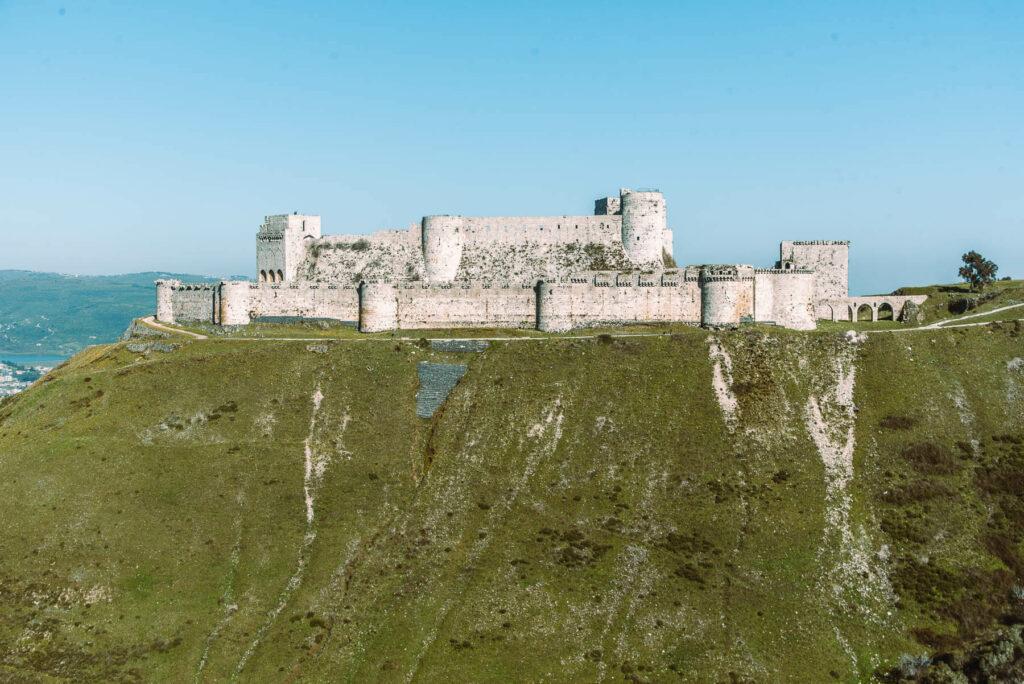
Syria: classic itinerary with Bosra
Our classic 8-day itinerary during the best month of the year
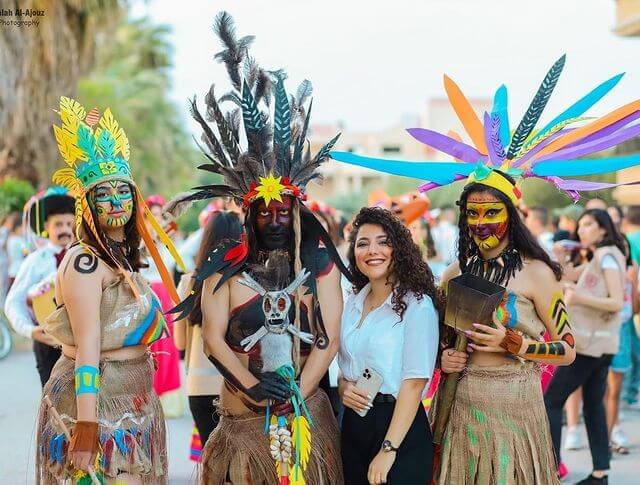
Syria with Marmarita festival
Come to Syria to experience the annual Marmarita Festival, while enjoying the Syrian coast, Aleppo and Damascus
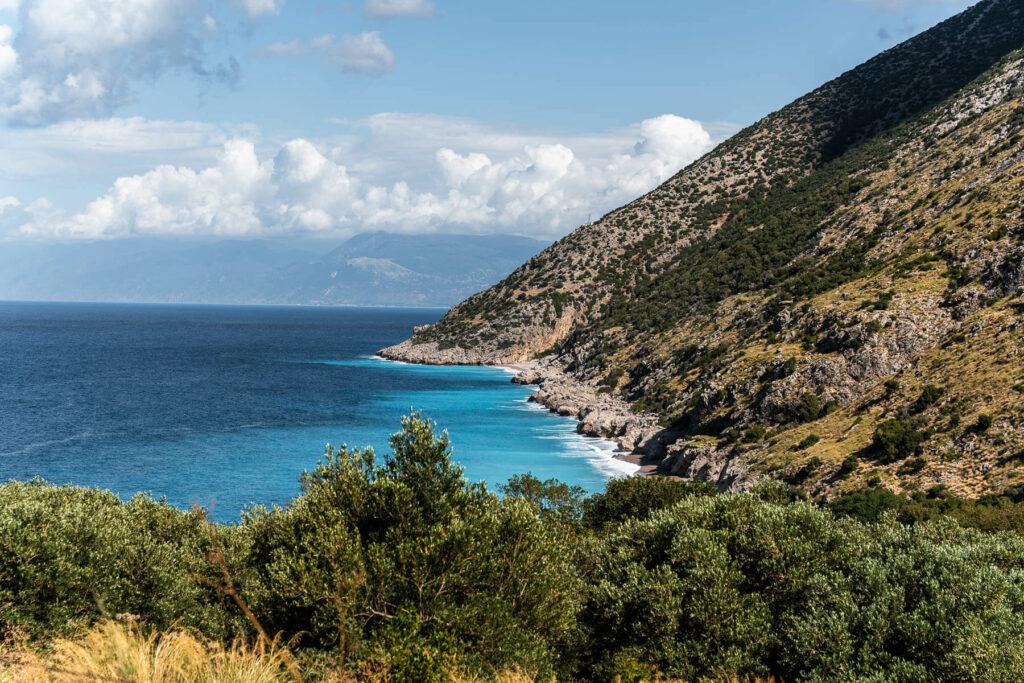
Full Syria in 13 days
From Latakia to Golan Heights, Palmyra and Aleppo, this is the most complete itinerary for Syria.
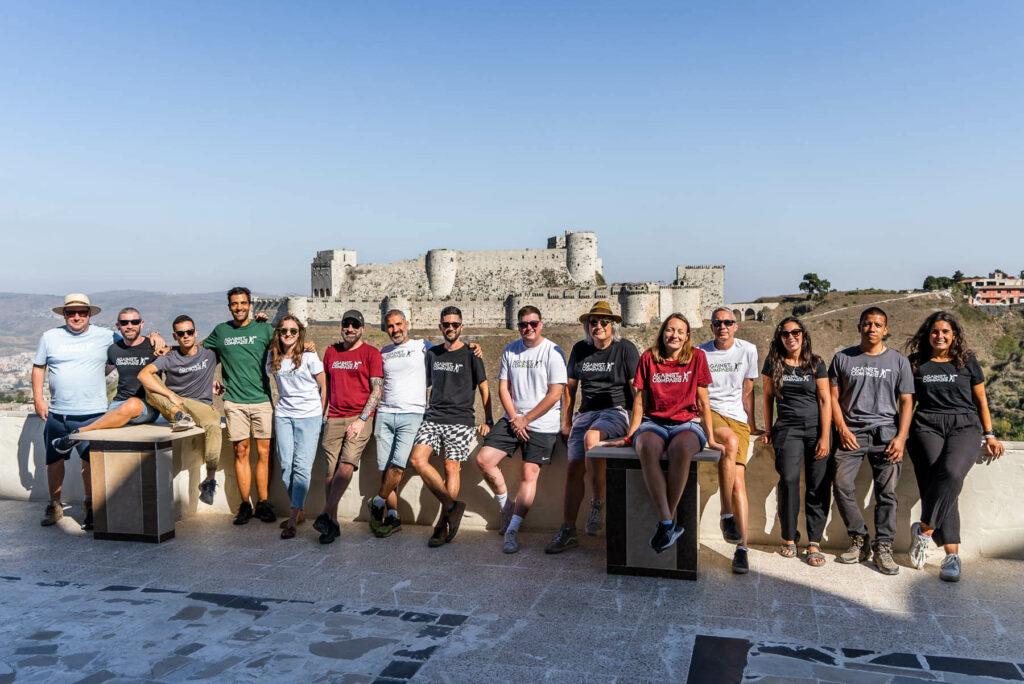
Syria in October
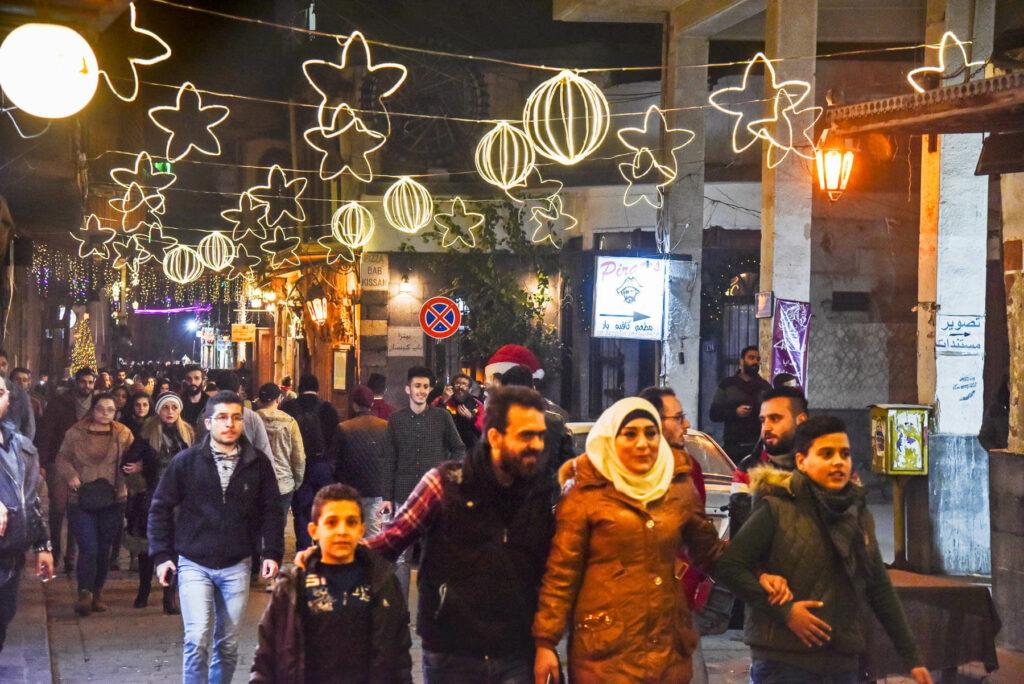
Syria Classic Itinerary for Christmas
Our classic itinerary during Christmas time!
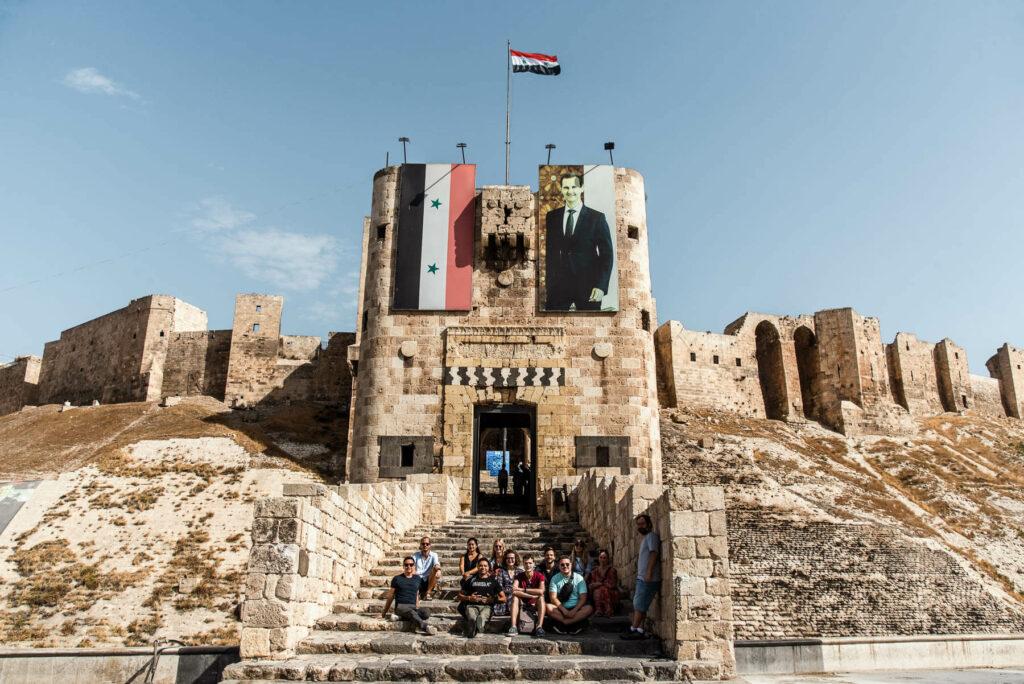
Syria during Ramadan
Our classic itinerary during the holiest month of the year in Syria
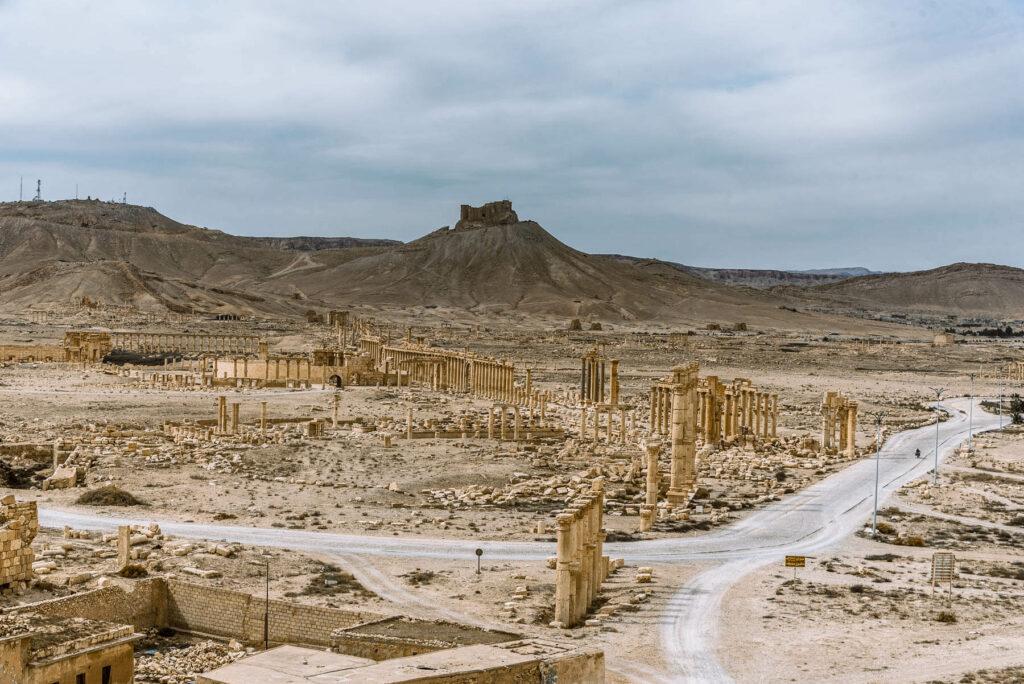
Syria for Easter (in Spanish)
Our classic itinerary during the magic of Easter
All our Syria Group Tours include
Transfer to and from Beirut
Accommodation
Security clearance (needed for the visa)
Private transportation and driver around Syria
Breakfast and lunch (in 8-day expeditions, otherwise, just breakfast)
Special permit for Palmyra & Bosra
English-speaking Syria tour guide
Western Tour leader (in 8-day expeditions)
Entrance fees to the places listed in the itinerary
Private, tailored trips for Syria
Do you want to travel solo, or with a group of friends?
From 1-day trips to Damascus (from Beirut or Amman) to compelling multi-day itineraries, we are able to design any sort of adventure based on your needs, 365 days a year.
If you can’t afford a private, solo trip, we can also help you find other partners to travel with.
Tell us your dates
When do you want to travel to Syria
Which places do you want to visit
We will design the perfect itinerary based on your needs
Where do you want to start from
Beirut, Amman or Damascus?
Sample itinerary for our Syria vacations tours
Here’s the standard 8-day tour we offer on most of our expeditions.
Day 1 – Beirut and Damascus
- Starting in Beirut at 8am, from where we will drive towards the Syrian border and Damascus.
- Check-in at the hotel in Damascus, followed by a traditional welcoming lunch
- Strolling around the old city, beginning to assimilate that we are truly in Syria
- Night out. The Christian district is particularly vibrant, filled with bars and restaurants.
Day 2 – Full day in Damascus
- With more than 5000 years of history, Damascus might easily be the oldest capital in the world, a city absolutely packed with historical sites, as well as lively souks and bazaars.
- We will visit all highlights, including Umayyad Mosque (where Yahya is buried, John the Baptist for Christians), Sayyidah Ruqayya Mosque, the bazaars and more.
Day 3 – Maaloula, Mar Musa, and Aleppo
- Drive towards Aleppo, stopping in Maaloula, one of the most important Christian towns in the Middle East, and one of the very few places in the world where people still speak Aramaic, the language of Jesus.
- Maaloula was occupied by Al-Nusra, and it was largely destroyed due to the recent war, but its most important churches and monasteries have been rebuilt
- Visiting two of its most important churches, where we will get the chance to meet nuns who were kidnapped and held as hostages for three months.
- Then, visit to Mar Musa, a mind-blowing, skyscraper-shaped, 6th-century monastery raised in the middle of rocky mountains.
- Overnight in Aleppo.
Day 4 – Aleppo
- Once the most populated city in Syria, Aleppo was one of the most affected cities by the Syrian war.
- Life, however, is coming back to Aleppo, visible in the ongoing reconstruction and all the people who are slowly returning to their beautiful home city.
- Among other things, we will visit the Citadel of Aleppo – the last Syrian Army stronghold – as well as the historical souk and vibrant Christian district, which remained pretty untouched from the war, and is today filled with absolutely delicious restaurants serving Lebanese wine.
Day 5 – Hama, Krak de Chevalier, Al Mishtaya
- On the way to Krak, stop in Hama, a pretty photogenic town, famous for its water wheels, all over the city.
- Then, we will head for Krak des Chevaliers, once described by Lawrence of Arabia as the most wholly admirable castle in the world , absolutely gorgeous and surrounded by lush green hills.
- Lunch in a restaurant with stunning castle views
- Evening and overnight in Al Mishtaya, a lovely Christian town with a pretty nice evening atmosphere.
Day 6 – Palmyra and Homs
- Palmyra is rich in both ancient and contemporary history, since the archaeological site was taken by ISIS on two separate occasions during the war.
- ISIS blew up the most important temple, but the site is huge and most of its structures are still standing.
- We will visit the ancient place escorted by a member from the Syrian Army
- After a picnic lunch inside the ruins, we will head back to Damascus and, on the way, we will stop in Homs.
- Overnight in Damascus
Day 7 – Bosra
- Day trip to Bosra, an ancient city home to one of the most admirable Roman amphitheaters in the whole world, as well as other important monuments.
- In Bosra, the local Syrians are culturally different, similar to Bedouins.
- We will have lunch in a traditional Bedouin tent, with locals from Bosra.
- Overnight in Damascus.
- Day 8 – New Damascus and goodbye
- Visiting the new part of Damascus, including the National Museum and the handicraft market
- Strolling around the souks, for shopping, buying souvenirs, etc.
- After lunch, back to Beirut, around 8pm.
Join a tour in Syria: FAQ
What makes against the compass different from other companies.
Show, not tell. You can check our latest documentary below.
In order to come to Syria , you must first obtain a security clearance (Letter of Invitation). We will take care of that, so you don’t need to visit the embassy.
How much does the visa cost?
These are the latest visa fees updated in 2024.
Price varies depending on nationality:
- European passport holders: 75 USD
- Canadian passports: 100 USD
- British, Australian, and Argentinian passports: 150 USD
- US passport holders: 200 USD
The visa fee is paid at the border, to the respective authorities.
Which nationalities can join this tour?
All nationalities, and that includes US passport holders.
Syria started issuing visas for Americans in March 2023, so US citizens are welcome to join too.
Are there ATMs in Syria?
Your credit card can’t be used in Syria. You must bring all your money in cash.
Which currencies do they accept?
Mostly US dollars ($) but € can be exchanged too.
If I want to join a Syria tour, where does it usually start?
Our scheduled group tours into Syria generally start in Beirut. It’s just easier, since flights into Damascus get canceled often and Amman is further.
However, for a private Syria tour, you can start from anywhere you like, including Beirut, Amman, and Damascus International Airport.
Do you recommend a specific travel insurance?
Either you are joining one of our trips, or you are traveling by yourself, you might want to look for proper travel insurance. Against the Compass has been a partner with IATI for several years already, recommending it to all readers, as well as covering all Joan Torres’ personal trips.
We like it because It covers all the countries where the FCDO advises against all travel, it offers budget plans and covers all sorts of adventure activities.
Against the Compass readers can benefit from a 5% discount .
Get a quote here to claim your discount
Gallery of photos
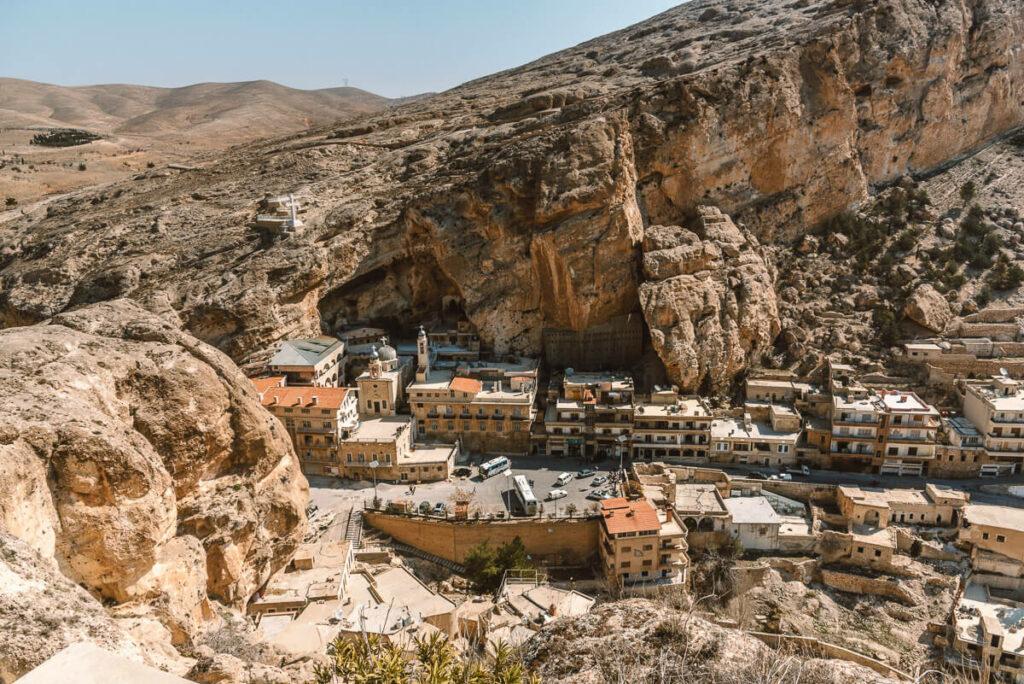
Your message
Get In Touch
Request more info or book a tour.
Fill in the form and we'll get back to you in no time!
Our Story
Rocky road travel, rocky road blog, all destinations, afghanistan, afghanistan tours, mauritania tours, south sudan, south sudan tours, socotra tours, syria tours, pakistan tours.

Syria Tours
Group & private syria tours.
We organise both private and group tours to Syria. Whether you’re looking for a one day trip to Damascus or a 15 day bespoke whole Syria tour – we’ve got you covered.
Share this page:
Our Syria tours start and finish in either Beirut, Amman or Damascus airport. Our team of guides and drivers will pick you up and escort you from wherever you wish to start and finish.
All scheduled group tours start and finish in Beirut. Transfers from Beirut to and from Damascus are included in the tour price.
We constantly monitor the situation on the ground with our partners in Syria. Tour itineraries are subject to last minute changes depending on the security situation.
Entry will be refused to those with Israeli stamps in their passport.
Check out our full list of group trips below – all our groups are capped at only 12 people .
Prefer a private trip? We can arrange a tour for any number of people on any dates – just get in touch and let us know when you want to travel.
Covid - 19 Update
The Syrian borders are open to international tourism with zero covid requirements.
Damascus – Maaloula – Krak des Chevalier – Homs – Aleppo – Lattakia – Tartous – Hama – Palmyra – Bosra.
Unsure of where to go? Check out our Map & Sample Itinerary below
You can travel to Syria on any dates but the summers can get quite hot and the winters are cold and snowy. All places we visit and include on our itineraries are regarded as safe.
All museums are closed on Tuesdays.
Damascus, SY
The Syrian visa on arrival takes approx 2 weeks to process and is open to most nationalities worldwide.
Get in touch and we will let you know if you qualify for a tourist visa.
We will inform you when your security clearance is approved, then you are free to collect the visa on arrival at the border.
Group Tours

Itinerary Summer 2024
It’s our most comprehensive Syria tour – covering the essentials plus the Mediterranean coast, Bosra and one hell of a festival!
- August 11 - 19th, 2024

Itinerary Autumn 2024
Our classic 7 day Syria tour taking in Damascus, Aleppo, Homs, Maaloula and Palmyra!
- September 16 - 22nd, 2024

Itinerary December 2024
No better place to ring in the new year than Damascus Old Town!
- December 27 - Jan 2nd, 2025

Itinerary March 2025
See Damascus, Homs, Aleppo, Palmyra & much more on this tour of Syria from Beirut return!
- February 28 - March 6th, 2025

Itinerary Easter 2025
What better place to spend your hard-earned Easter break! Spring time is also the perfect time to visit Syria.
- April 18 - 24th, 2025
Sample Itinerary
Beirut – Damascus – Krak de Chavaliers – Homs – Aleppo – Damascus – Beirut.
Day 1 - Beirut / Damascus
- Early pick up from Beirut, Lebanon .
- Transfer to the Syrian border for exit/entry formalities.
- Continue onto Damascus by private car.
- Check into your incredible Old Damascene hotel. Take a short rest before starting a walking tour of the old town.
- In the afternoon we’ll explore the Al-Hamidiyah Souq .
- Free time in the evening to enjoy Damascus’ vibrant night-life along “Straight Street”.
- Optional visit to a Hamam for an evening scrub! There’s no better way to end your first day in Damascus than relaxing in one of it’s ancient bath houses.
- Overnight in Old Damascus .
Day 2 - Damascus
- After breakfast, we’ll start our full day Damascus city tour .
- Visit the National Museum of Syria.
- Explore the Handicraft market for some of the best handmade goods in the Middle East.
- Azem Palace (a perfect example of a traditional Damascene house turned museum of the Ottoman times)
- Umayyad mosque (a place of worship since the first millennium B.C. It was once a church and now one of the most unique and important mosques in the world).
- Visit The church of St. Ananias , the window of St.Paul .
- Dinner and and overnight in Damascus.
Day 3 - Malloula, Krak des Chevaliers & Homs
- Drive onto Maaloula , a small Christian town that was almost completely decimated by ISIS in 2014. It’s one of the most scenic villages in Syria and is the only place in the world where Aramaic; the language spoken by Christ is still used as a living language
- We’ll visit a Catholic church which was destroyed but has already been largely rebuilt.
- Continue driving to Krak Des Chevaliers – “The most wholly admirable castle in the world.” – According to Lawrence of Arabia – and one of the most important preserved medieval crusader castles in the world.
- After touring the castle, we continue onto Homs . Witness some of the rebuilding efforts underway and visit Khaled Ibn Al-Walid shrine .
- Dinner and overnight in the Homs countryside.
Day 4 - Homs & Aleppo
- Homs tour including a visit to the St. Mary’s Church of the Holy Bel t – the seat of the Syriac Orthodox Church.
- Depart for the 2 hour drive north to Aleppo.
- Arrive in the early evening.
- Explore some of the old town around the citadel by night.
- Dinner at a famous Armenian family run Syrian restaurant.
- Overnight in Aleppo .
Day 5 - Aleppo
- Aleppo was arguably one of the worst affected cities during the Syrian war. Here you’ll get the chance to see some of the terrible destruction as well as the opportunity to witness the early stages of the massive rebuilding projects that Syrians are now undertaking.
- Our first stop in the morning will be the famous Aleppo Castle .
- We’ll also be able to see the destroyed souk and see the fully restored parts.
- Visit the Aleppo Museum and walk through the adjoining markets.
- Visit the Baron Hotel – one of Aleppo’s most famous landmarks. It’s the oldest still functioning Hotel in Syria which once welcomed the likes of Charles De Gaulle, Yuri Gagarin, Lawrence of Arabia, Agatha Christie and Theodore Roosevelt. Stay here if you dare but you will have to do without heating, electricity or hot water.
- Dinner & overnight in Aleppo
Day 6 - Hama & Damascus
- Departure after breakfast to Hama . We’ll visit the famous waterwheels here which once provided vital water ways to the land.
- Drive back to Damascus , with some scenic stops along the way.
- Arrive in Damascus in the late afternoon. Check back into our hotel.
- Free time to explore for the rest of the day.
- Overnight in Damascus.
Day 7 - Damascus & Beirut
- Final sightseeing around the places you might have missed before!
- Last chance for souvenirs at the craft market.
- After lunch begin the drive back to Beirut by private transfer.
- End of tour.
Most frequent questions and answers for our tours to Syria.
Following the war, Syria has recently become safe again for travel. All the places we visit on our Itineraries are safe and we do not venture to places which are not deemed safe for foreigners.
Travel insurance is a must. We have teamed up with IATI Travel Insurance because they provide cover for all our destinations. You’ll also automatically receive a 5% discount with them as a Rocky Road Travel customer.
Syria enjoys a temperate Mediterranean climate. Spring and early Autumn are perfect. It gets pretty cold in the winter and hot in the summer. We can arrange travel for any dates of your choice.
The easiest way is overland from Beirut where most of our tours start. It’s also possible to start from Amman, Jordan.
USD is the main currency for exchange into the Syrian pound. Make sure to bring cash as ATM’s are unreliable.
Our scheduled group tours have a maximum of 12 participants only.
When you sign up for one of our tours we will apply for a Syrian security clearance on your behalf. This will then allow you to travel to Syria and pay for your visa on arrival at the border. To apply for the security clearance we require the following info:
-a scan of your passport
-your address
-a proof of current or previous employment
The restaurants we visit cater for vegetarians, vegans and other unique dietary requirements out there. We do recommend bringing in some snacks from home just in case you get the munchies on the road and can’t find anything suitable at the time.
YES! We strongly recommend giving a tip to your local guide and driver at the end of the tour.
For men, regular clothing is fine. Women should cover shoulders and knees in holy places. Hair only needs to be covered in one or two mosques. Abaya’s will be provided when needed.
syria tours
choose your dates
Available 365 days a year.
Choose your starting point
Beirut, Amman or Damascus.
Choose your itinerary
One day to fifteen day options.
get in touch
It's that simple!
Further Reading

How to spend 24 hours in Beirut
All those about to embark on, or just returning from one of our Syria tours will find themselves in Lebanon’s high-octane capital, Beirut. Beirut is

Is It Difficult To Travel To Syria?
How to get into Syria travelling to Syria is not totally foolproof, and there are certain instances where entry will be denied. Depending on your

Top 5 Syrian Foods You Should Try
The best of Syrian Food Put simply, the food in Syria is outstanding. Mediterranean ingredients combined with ancient techniques and Arabic flavours; those into their

📞 +491635158517 ✉️ [email protected]
Destinations
- Afghanistan
- North Korea
- Papua New Guinea
- South Sudan
- Agents & Partners
- Terms & Conditions
- Privacy Policy
- Sustainability
- Travel Insurance
Subscribe To Our Newsletter
Keep in touch with the latest news and info on our unique destinations.

Get in touch
Request more info or book a tour.
Fill in the form and we’ll get back to you in no time!
- Election 2024
- Entertainment
- Newsletters
- Photography
- Personal Finance
- AP Investigations
- AP Buyline Personal Finance
- AP Buyline Shopping
- Press Releases
- Israel-Hamas War
- Russia-Ukraine War
- Global elections
- Asia Pacific
- Latin America
- Middle East
- Election Results
- Delegate Tracker
- AP & Elections
- Auto Racing
- 2024 Paris Olympic Games
- Movie reviews
- Book reviews
- Personal finance
- Financial Markets
- Business Highlights
- Financial wellness
- Artificial Intelligence
- Social Media
Members of US Congress make a rare visit to opposition-held northwest Syria
FILE - Rep. French Hill, R-Ark., nominates Rep. Kevin McCarthy, R-Calif., for the eleventh time in the House chamber as the House meets for the third day to elect a speaker and convene the 118th Congress in Washington, Thursday, Jan. 5, 2023. Three U.S. Congress members, including Hill, made a brief visit to opposition-held northwest Syria on Sunday, Aug. 27, the first known trip to the war-torn country by American lawmakers in six years. (AP Photo/Alex Brandon, File)
FILE - Rep. Ben Cline, R-Va., speaks during a Republican Study Committee news conference on the FY2024 budget, Wednesday, June 14, 2023, on Capitol Hill in Washington. Three U.S. Congress members, including Cline, made a brief visit to opposition-held northwest Syria on Sunday, Aug. 27, the first known trip to the war-torn country by American lawmakers in six years. (AP Photo/Mariam Zuhaib, File)
FILE - Rep. Scott Fitzgerald, R-Wis., speaks House Rules Committee prepares a measure for a floor vote at the Capitol in Washington, Monday, Dec. 5, 2022. Three U.S. Congress members, including Fitzgerald, made a brief visit to opposition-held northwest Syria on Sunday, Aug. 27, the first known trip to the war-torn country by American lawmakers in six years. (AP Photo/J. Scott Applewhite, File)
- Copy Link copied
BEIRUT (AP) — Three Republican members of the U.S. Congress made a quick trip Sunday into opposition-held northwest Syria in the first known visit to the war-torn country by American lawmakers in six years. They urged the Biden administration and regional partners to keep up the pressure on Syrian President Bashar Assad.
The roughly one-hour stop was a signal of the significant support on Capitol Hill for the opposition in Syria’s long civil war.
U.S. Rep. French Hill of Arkansas, one of the three lawmakers, told The Associated Press by telephone after leaving Syria that the trip was the latest of his several to the region this summer to press the U.S. government and Arab allies to continue pushing for a political resolution to the war.
Hill said his message was in behalf of “those in Syria who want to have their own representative government.”
The conflict began in 2011 after Assad launched a campaign to crush what began as a peaceful uprising against his family’s autocratic rule. Assad has held on to power despite the uprising thanks in large part to the armed intervention by allies Russia and Iran. But the conflict has splintered the country, killed at least 300,000 civilians , and displaced half of Syria’s prewar population of 23 million.
The trip comes at a time that Middle East leaders have begun restoring relations with Assad’s government. By doing so, the Arab leaders are breaking sharply from the U.S., which is pushing to keep Assad isolated over government abuses that the United Nations says include repeated use of chemical weapons against Syrian civilians.
The U.N says 300,000 Syrian civilians died in the first 10 years of the conflict.
Hill and his fellow lawmakers, Ben Cline of Virginia and Scott Fitzgerald of Wisconsin, entered Syria early Sunday from Turkey via the Bab al-Salama crossing in northern Aleppo province.
They were greeted by orphans who attend Wisdom House, a school for orphans that is a project of the Syrian Emergency Task Force, a U.S.-based Syrian opposition organization that facilitated the lawmakers’ trip.
Hill’s constituents in Arkansas have been leading donors to the school. “It was an emotional day for me to see those children, holding up pictures of their parents who’d been murdered by Assad’s regime, getting a hug and a kiss from them,” he said.
The children were students at Wisdom House, a school for orphans that is a project of the Syrian Emergency Task Force, a U.S.-based Syrian opposition organization that facilitated the lawmakers’ trip. Hill’s constituents in Arkansas have been leading donors to the school.
The lawmakers met with opposition and humanitarian leaders, including Raed Saleh, head of the White Helmets, a volunteer group of first responders known for extracting civilians from buildings flattened by bombing.
Saleh spoke with the lawmakers about the political status of the conflict in Syria and on continuing humanitarian efforts for victims of a earthquake earlier this year in Turkey and Syria, the White Helmets said on X, the site formerly known as Twitter.
Security concerns meant there was no public announcement of the trip beforehand. Hill spoke from neighboring Turkey, where the congressmen also held a series of meetings.
The last-known trip by a U.S. lawmaker to Syria was in 2017, when Sen. John McCain, R-Ariz., visited U.S. forces stationed in northeast Syria’s Kurdish region. McCain had previously visited Syria and met with armed opposition fighters.
Also in 2017, U.S. Rep. Tulsi Gabbard, D-Hawaii, visited Damascus, the capital, and met with Assad, a decision that was widely criticized at the time.
Since the beginning of the uprising-turned-civil-war in Syria, the U.S. government has backed the opposition and has imposed sanctions on Assad’s government and associates over human rights concerns. Washington has conditioned restoring relations with Damascus on progress toward a political solution to the 12-year conflict.
A growing number of Arab leaders are moving to end their own isolation of Assad, in line with arguments that engagement is the best way to address the flow of refugees, illegal drugs and other problems for the region from Syria. The 22-member Arab League recently reinstated Syria as a member after cutting ties earlier in the Syrian war.
Hill said he had engaged Middle East governments repeatedly over the past three months about “what are the ramifications of the Arab League’s admission of Syria back to the League and yet asking nothing” of Assad in return in terms of greater political freedoms and an end to rights abuses.
Hill also is pushing for the U.S. and Arab countries to press Assad harder on Syria’s status as the world’s leading global trafficker of Captagon, a highly addictive amphetamine.
Congress late last year passed a mandate for the U.S. to target Captagon smuggling in the Middle East, and President Joe Biden signed it into law.
Hill accused Biden of not doing enough to pressure Assad to adopt political reforms and stop the flow of that illegal drug, an important source of revenue for the Assad government.
“What I believe Syria needs, and the same thing the U.S. needs, is American leadership, Hill said.
Neither the State Department nor the White House had immediate comment on the Republican lawmakers’ trip.
Control of northwest Syria is largely split between the Turkish-backed opposition groups and Hayat Tahrir al-Sham, a group that was originally founded as an offshoot of al-Qaida and is designated as a terrorist organization by the United States. In recent years, the group’s leadership have attempted to publicly distance themselves from their al-Qaida origins.
The Turkish-backed opposition groups have regularly clashed with Kurdish forces based in northeast Syria, who are allies of the United States in the fight against the Islamic State.
Knickmeyer reported from Washington. Associated Press writer Omar Albam in Idlib, Syria contributed to this report.

COMMENTS
r/VisitSyria: Welcome! We are here to share information, personal experiences and travel tips with people planning to visit our beautiful country…
Damascus and Latakia are probably the most stable places, but I wouldn't even consider calling them safe, and if you're considering going there - don't. Visit Syria some time later. Qamishli is much more stable than Damascus and Latakia. Mikä tilanne on nyt. I spent 6 days in Northern Syria last month.
Traveling to Damascus from Beirut is the easiest way to travel to Syria. Beirut is only 115km from Damascus and the journey takes 2 to 4 hours, including the customs process. If you book a Syria tour with Against the Compass, we will take care of your transfer from and to Beirut, no problem.
As a result, one should not hesitate to stay in low cost budget hotels, which often offer private rooms for as little as $10 US per night and are usually of quite good value. Public transportation in Syria is remarkably cheap and efficient. Long distance buses all over the country are frequent, comfortable and rarely cost more than $6 or $7 USD ...
The most ideal time to visit Syria would be between March and May when the temperature is around 20°C. Similarly, but without as many blossoming flowers, between September and October is also a reasonable period to visit Syria. Summer temperatures can reach 45°C whilst winter can be wet, cold and with the possibility of snowfall. ...
More safe places to visit in Syria. There are more places in Syria that are safe to visit: Hama: the city with the 17 norias. Al Mishtaya and Marmarita: lovely Christian villages close to Krak. Sidnaya: Christian town close to Maaloula. Tartous and Latakia: the two main coastal cities. Arwad: the only inhabited island in Syria.
Syria Travel Advisory. Travel Advisory. July 13, 2023. Syria - Level 4: Do Not Travel. O K U T. Reissued with obsolete COVID-19 page links removed. Do not travel to Syria due to terrorism, civil unrest, kidnapping, armed conflict, and risk of unjust detention. Country Summary: The U.S. Embassy in Damascus suspended its operations in February 2012.
Syria is actually a very affordable country to visit. It is for sure the cheapest country I have been to so far. A full traditional meal for 3-4 people at a middle-to-high-end restaurant will set you back around 15-20$ in total. A sandwich will cost around 1-2$, and a soda 1$ tops. Small souvenirs like keychains etc., cost around 0.5$ per piece.
By Olga Khazan. August 16, 2012 at 2:25 p.m. EDT. Liz Sly. The Washington Post's Liz Sly, has made several brief visits to Syria since the uprising began, and she shared her impressions with ...
For additional travel information. Enroll in the Smart Traveler Enrollment Program (STEP) to receive security messages and make it easier to locate you in an emergency. Call us in Washington, D.C. at 1-888-407-4747 (toll-free in the United States and Canada) or 1-202-501-4444 (from all other countries) from 8:00 a.m. to 8:00 p.m., Eastern ...
In order to visit Syria, you will need to obtain a visa. As you cannot travel completely independently (like you can in Iran) you will currently need a special security clearance that needs to be organized through a travel agency in Syria. Note: You could go to Syria with an invitation letter from a local who's not an official guide but that ...
UK government support. There is no UK government support available in Syria, as all British Embassy services in Damascus are suspended. If you need help, call the FCDO in London on +44 (0)20 7008 ...
In this Syria travel itinerary, you will find: Table of Contents Show. Itinerary. Map. Day 1 - Arrival in Damascus. Day 2 - Old City of Damascus. Day 3 - Maaloula and Mar Musa. Day 4 - Full day in Aleppo. Day 5 - Hama and Krak de Chevaliers.
Use insect repellent. Consider taking anti-malarial medication. Waterborne, foodborne, parasitic and other infectious diseases are common. These include brucellosis, typhoid and hepatitis. Drink only boiled or bottled water. Avoid raw or undercooked foods and unpasteurised dairy products. Full travel advice: Health.
Jeff S. Ioannis Meletiadis. April 11, 2024. In March 2024, I took my first group tour with Against The Compass to Syria. Accompanied by the knowledgeable guides Leticia and Mohammed, we explored the enchanting souqs, mosques, churches, and numerous historical landmarks in Syria, often having them all to ourselves.
After breakfast, we'll start our full day Damascus city tour.; Visit the National Museum of Syria.; Explore the Handicraft market for some of the best handmade goods in the Middle East.; Azem Palace (a perfect example of a traditional Damascene house turned museum of the Ottoman times); Umayyad mosque (a place of worship since the first millennium B.C. It was once a church and now one of the ...
Updated 12:24 PM PDT, August 27, 2023. BEIRUT (AP) — Three Republican members of the U.S. Congress made a quick trip Sunday into opposition-held northwest Syria in the first known visit to the war-torn country by American lawmakers in six years. They urged the Biden administration and regional partners to keep up the pressure on Syrian ...